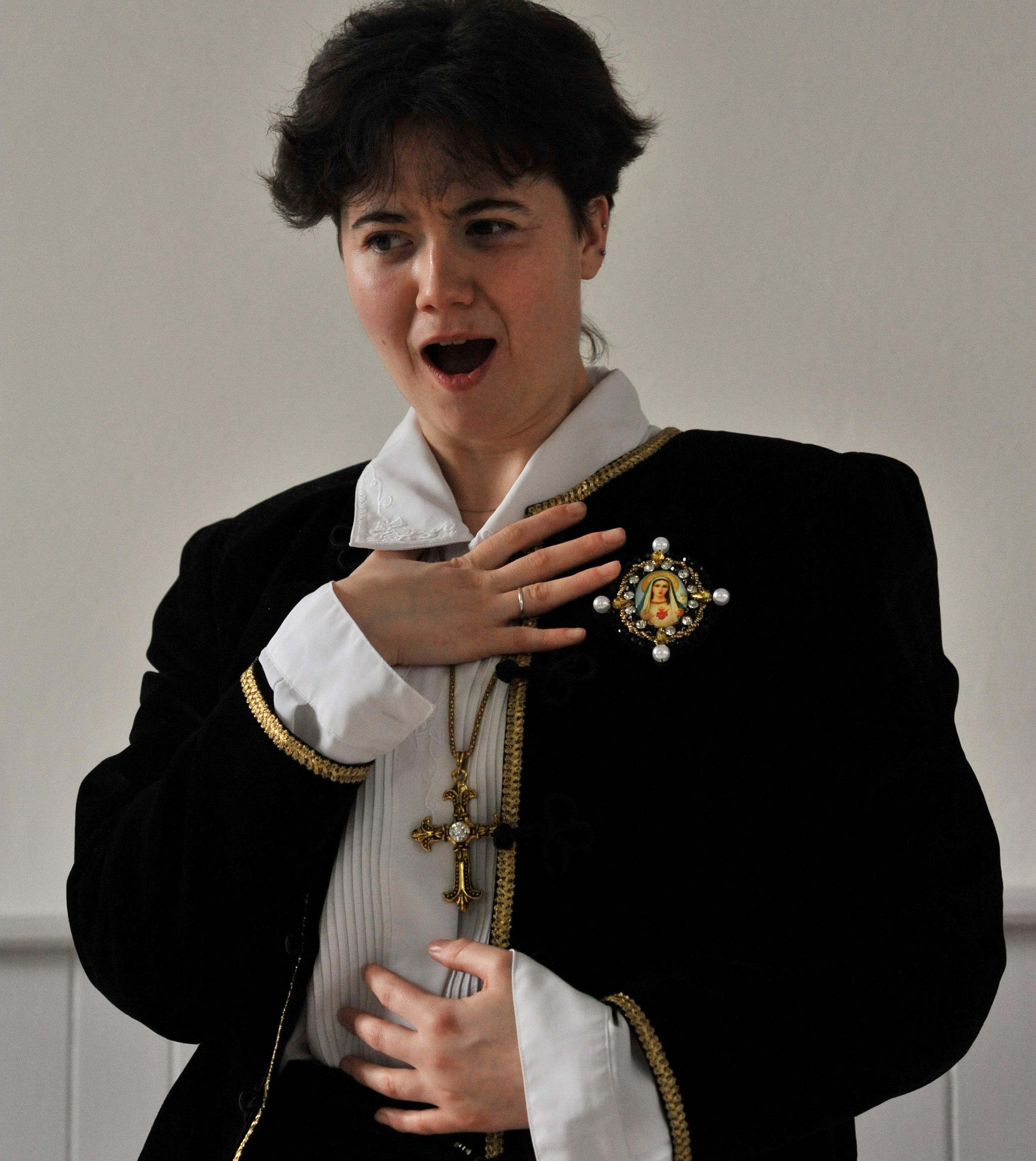Motley speaks to Justice Marie Baker
Female Queerness in The Last of Us



Niamh Browne Editor in Chief
Niamh Browne is a final year philosophy and art history student. She has previously written for publications such as Motley, Hot Press and the Irish Examiner. She is a part-time mad bastard.
Klaudia Kulas
Web Editor









Klaudia is studying Computer Science and is a self employed illustrator. Her hobbies consist of drawing, claiming people's cats as her own, and playing videogames.
Ronan Keohane Current Affairs Editor

Ronan is a 3rd year world languages student with a strong interest in political philosophy and international relations. He is passionate about education, the environment and minority rights.


Seán Enda Entertainment Editor
Seán Enda studies Digital Cultures, but don’t ask him to explain that because he’s not so sure either. His writing has featured in many publications, including several bathroom walls
ustine Lepage (also known online as Loucoffee), is currently pursuing the MA in Arts Management and Creative Producing. Her work has been published in magazines like Sound of Brit or the Outpost Eire. She is interested in maximalism and funky gnome fashion.

Édith studies Commerce & Irish and previously worked with UCC’s University Express. She’s relying on a diet of Coke Zero, Desperate Housewives and Taylor Swift to get her through final year.
Kevin M. Smith Graphic Designer

Kev live, laugh, loves long walks on the beach and is a tired designer from Cork. He has a degree in colours from CIT and in his spare time makes comic books available nationwide. Ask him about the Fungie The Dolphin conspiracy.
Lisa Ahern Social Media & Deputy Editor
Lisa is a second-year BA English student and has previously written for Motley magazine in the past. She spends her time reading and writing, your typical Rory Gilmore wannabe.
Tiernán Ó Ruairc
Deputy Current Affairs Editor
Tierán is a first year arts student, with an interest in international relations and Irish Policing. Currently trying to catch up with the rest of the team’s writing experience.

Chloe Barrett Deputy Entertainment Editor
Chloe is a third year English student and was previously the Gaming Editor for the University Express. She reads an unhealthy amount of books and loves her dogs a totally normal amount, she promises.

Sinéad Mckeown
Deputy Fashion Editor
Sinéad is a final year English student who has been published in the Quarryman. She enjoys reading, writing and pretending to prepare for exams. She finds comfort in having her research tabs open on the computer while she binges Supernatural.

Sarah O’Mahony
Deputy Features
Sarah is a second year English and Politics student. Shortlisted for a features award at the 2022 SMEDIAs in Dublin, she’ll only go to the big smoke if there’s free food involved.





Emily Mary Dollery Jessica Anne Rose Lizzie Kelly Saoirse Ní Dhonnabháin
Amir Folorunso Ava Somers Baneen Talpur Elizabeth Collins
This publication is made from 100% sustainably sourced paper. Motley welcomes letters from readers, emailed to editor@motley.ie. Motley is published by Motley Magazine, The Hub, UCC, Western Road, Cork. Printed by City Print Limited, Victoria Cross, Cork. Copyright 2022 Motley Magazine. All rights reserved. Reproduction in whole or in part without written permission is strictly prohibited. All efforts have been made to ensure that details and pricing are correct at time of print. Motley magazine does not take responsibility for any errors incurred. This magazine can be recycled either in your green bin kerbside collection or at a local recycling point.
Front Cover Photography by: Max Bell
Featuring: Samira Sikder & Konrad Dagiel
Images Provided by Unsplash.com Vectors provided by Vecteezy.com and Freepik.com

Aristotle once defined woman as a ‘deficient man’. That she was somehow hollow, empty or lacking something fundamental of the qualities that man possessed. This quality of lacking meant she was inferior. The origin and structure of patriarchy is long, complicated and disputed but there is no doubt that Western civilisation has lived and still does live under the spectre of patriarchy. This deficiency that woman innately possessed was in no small part due to our ‘hollowness’ - the female sexual organ. Meaning we are empty, void and inferior.
It is the view of this magazine and mainstream biological research that the female sexual organ does not a woman make. There are women that don’t have vaginas and there are people with vaginas who are not women. The more we research gender the more we realise how fluid it is, how constructed it is and how sexual organs have little to do with it.
However, there are challenges that people with vaginas face that others do not. Nowhere is this more apparent than access to healthcare. For hundreds of years, all resources and medical research were put into the male form, whereas a lot of what we know about the female sexual organ was obtained through the abject torture of enslaved black women in the United States. Indeed, J. Marion Sims, who conducted these experiments is known as the ‘father of modern gynaecology’.
The present day is not much better when it comes to healthcare for people with uteruses. In Afghanistan, women can no longer study to become doctors nor practice as them. Furthermore, women cannot be treated by a male doctor. Meaning that women in Afghanistan are left without healthcare. In Ireland, Vicky Phelan passed away on the 14th of November 2022, she was one of the 206 women who were diagnosed with cervical cancer after being given an incorrect smear test result. Of these women, 162 of them had not been told the initial results had been incorrect. It was reported that in 2017 Dr Gráinne Flannery, CervicalCheck’s clinical director advised a
Niamh Browne Editor In-Queef

gynaecologist not to tell these patients about the reevaluated test results, but to file the results instead. It seems to have a uterus is to accepts substandard healthcare. Motley Magazine revisits this healthcare scandal and medical misogyny in this issue.
Speaking of Aristotle, we also have an interview with Supreme Court Justice Marie Baker who completed a master's in philosophy here at UCC on Aristotle’s notion of law. Marie Baker was the judge on the High Court case of PP v HSE where the question of whether or not a pregnant woman who was brain dead should be kept on life support until the foetus was delivered. This case came before the court before the repealing of the eighth amendment. The woman’s next of kin wished to turn off the life support but the hospital staff were unsure if this would violate the foetus' right to life in the constitution at the time.
As we explore the medical research into vaginas there arise new ethical questions. Surrogacy, birth control, gender-affirming healthcare and post-natal care are all fields developing rapidly. Motley offers a glimpse into this brave new world of vaginas.
Finally a note on the title. Originally the issue theme of ‘women’s health’ was bounced around. However, not everyone with a uterus is a woman and not everyone without one is excluded from the term woman. The media in both Ireland and elsewhere has taken a scary transphobic turn and contrary to mainstream media’s popular belief, it is not the vocation of every journalist to make the lives of trans people harder. As a result, we have opted for the title vagina monologues to represent the complicated myriad of experiences that people with uteruses have to deal with. To quote the legendary rapper Craic Boi Mental: ‘Trans people are my friends, transphobes can catch these hands’. You know, I could’ve quoted Judith Butler here, but I think Craic perfectly articulates my feelings. Happy reading.

Motley speaks to Justice Marie Baker and we look Behind the Front Lines at Sexual Violence in War Time



P. 5
ISSUE No4 - MARCH 2023
MOTLEY.IE

Female Queerness in The Last of Us & Bojack Horseman shining a light on Women's Mental Health


P. 15
Checking up on CervicalCheck, Love, AI & Loneliness & What Is A Woman?
P. 23

Interviews Ireland's up and coming stylists & photoshoot: The Top 5 Government Approved Paths of Womanhood!
P. 35


Justice Baker is an exceptional individual, as anyone who sits on Ireland’s highest court is assumed to be. Her roots are quite ordinary though. Her father was a postmaster, and her mother worked in the home. She didn’t go to one of ‘the private schools lawyers were expected to go to’. Neither of her parents had any education above a junior certificate. Baker says: ‘I was the eldest of five. My parents had always assumed we would go to college. It was assumed I would become a teacher. I probably sounded like a teacher but I didn’t want to do that’. Baker encountered opposition to her education from a young age, wanting to do higher level maths for her Leaving Certificate but her single-sex girl’s school didn’t offer it. ‘I had to go to the boy's school for classes but it didn’t last.’ Baker continues “the headmaster of the boy's school thought it was “too distracting”’. It was not a common arrangement. ‘I was the first and only person to do it. I never quite understood it, in those days you wouldn’t ask your teacher what went wrong there. I wasn’t given a chance to ask “What that was about?”.’
Baker completed her Leaving Cert in 1971 and began studying philosophy at UCC. At this time Ireland was still deeply patriarchal, with the spectre of the church still influencing government policy. Archbishop McQuaid was alive and well and the marriage bar was still in place. I asked if this affected Justice Baker: ‘Marriage wasn’t on my mind, the marriage bar wasn’t on my mind. I think I always assumed that I would work and that I would work in a role that wasn’t the civil service’. It was through reading the texts of Camus and Sartre given to her by her French teacher Sister Anne, that Baker encountered philosophy: ‘Camus and Sartre showed me that there were other ways of thinking that were different to the straightforward catholic discourse. It wasn’t that I was rebellious, it was that by reading those texts my mind was opened to another way of thinking. I was only 17’. She continues: ‘I wanted to go to college to explore another way of looking at the world. It was as vague as that’. It seems that philosophy was the right fit for Baker and she believes ‘it was a good way of training my mind’.
Once she completed her degree, Baker, like so many humanities graduates, was at a loose end of what to do next: ‘I saw an ad in the back of the Irish Times looking for an English Teacher in the North of Spain so I went. With no Spanish. I went to Bilbao airport and I thought “oh what have I done”’. On her decision, she states, ‘I was 20 when I graduated with a degree in philosophy. It was the dark ages. It was 1974 in Ireland. There was no work for women. There was no work for anybody who lived in a small town in East Cork’.
1974 was an extraordinary year to be living in Spain as it was the eve of General Franco’s death, which brought a 39-yearlong fascist dictatorship to an end. ‘I was there the year when he died. It was impossible to leave Spain when that political discourse was going on. I lived in the Basque Country and it was the first time I had ever seen the application of philosophical thinking to an actual worldview. The El País newspaper and some of the Basque language papers (which I couldn’t read), were full of an analysis which we don’t engage with very much, it’s an analysis of what democracy means. Can you have a democracy with a king? How can you have a democracy when the elements of various constituencies are very different such as the Basques, Catalans, Andalusíans’.
Spain was not to be Baker’s home for life: ‘It was only in my third year that I thought “I can’t really stay here because I am kind of permanently on holiday”. I needed to think of some kind of career path or whatever. So I wrote back to the UCC philosophy department to find out what masters programmes they were offering, applied and got a place on it and came back’.This is where her legal brain kicked in: ‘I did a master's in philosophy with my thesis on Aristotle’s philosophy of law. Which explored how justice could still be achieved when there were still very strict and strictly defined rules in positive law. That set me off on the route of law’.
‘I knew by the time I finished my masters that I wasn’t good enough to be a professional philosopher and also that I wouldn’t like it. I quite liked the things that I heard from my friends who were studying law. They were all working the law. I liked how their minds applied general rules to individual facts. I thought then that what I might do is become an academic lawyer. Teach Jurisprudence in a law faculty’. With this new-found direction in mind, Baker decided to go back and do another BA: ‘The only reason I did a law degree is because I was supporting myself financially and I couldn’t afford to go to the grind schools. They were very expensive. Whereas if I did a law degree
for 10 or 12 hours a week I could work in a pub or whatever to support myself. Bit by bit by bit I thought to myself: “I like this way of working with the world. I’m a lawyer.” I mean what do you say?’.
Baker at this point knew that she wanted to be a barrister but it was not what she was encouraged to do. Quite the contrary. Indeed one of her lecturers told a future Supreme Court Judge: ‘that’s very foolish you’ll never make a go at it’.
‘I got lucky. There were only 20 women at the bar but some of them were really iconic barristers: Mary Laffoy (President of the Law Reform Commision), Mary Irvine (former President of the High Court) and Mela Caroll (first woman to serve as a judge on the High Court in Ireland). These were women who were living their lives as barristers. I also got lucky because young women were becoming solicitors, and wanted to brief women barristers. Even in my first year at the bar I got work I wouldn’t have gotten otherwise’. Ar an scáth chéile a mhaireann na mná it would appear. Baker continues: ‘The women were very supportive of each other. Not because we knew each other or went to the same school’.

Baker speaks warmly of her career as a barrister, of the colleagues she worked with, men and women alike and by all accounts seems to have massively enjoyed being a barrister. So what made her decide to become a judge? ‘I was thirty years at the bar when I took the bench. Twenty at the junior bar, Ten as a senior counsel. I took Silk (becoming a senior counsel) because I thought the quality of my work was suffering. I was too busy, I was always in a rush and I didn't do anything well enough. I thought if I took Silk I’d have less work, I’d be required to do it at a higher level and with more excellence in what I did’. The decision to become a judge was: ‘more a shot in the dark than anything else’.

The process was as follows: ‘I applied. I thought I’d like it. I thought something about the way I look at the world would be beneficial. I am always interested in looking for a clear position. I also thought that it was important to offer public service, to “give back” by taking judicial office. I got it and I absolutely love being a judge’. Her first appointment was as a High Court Judge, followed by the Court of Appeal followed by the Supreme Court. ‘It’s the hardest job by a long shot because all questions that come to us don’t have straightforward answers. In the High Court, you look for another case that gives you some of the answer. But when you’re in the Supreme court, you’re not stuck with what was decided by an earlier court because you’re free to explore why’.
But of course, as with everything, there is much more complexity to this role: ‘You’re watchful that you’re not leaving a hostage to fortune. You’re not leaving behind a proposition that

will bounce along and become a new point of law’. I can’t resist but bring Baker back to her first BA. Does Justice Baker think she would be the same lawyer she is without her background in philosophy? ‘I wouldn’t be the same lawyer I am without a philosophy degree. I am curious because of it and I still read philosophy. Oddly enough, I still pick up my Aristotle. He’s the author I come back to. I think his concept of how we think, how our understanding evolves from perceptions and observations -I think that is the key to understanding how human thinking is’.
‘My new job as Chair of the Electoral Commission will bring me back to Aristotle. Some of the work we will do will have to bring us around to principles involving fake news and the education of people understanding truth and sources of information’. It seems to wrap up the interview, bringing Baker’s career together in a nice little bow, but it was never planned that way she says:

Often, when we think of casualties in warfare; we think of people fighting at the frontline; however, the violence can often be much closer to home. Deputy Current Affairs Editor Tiernán Ó Ruairc writes about the dangers people with vaginas can experience in warfare.
Content warning: This article contains discussions of rape and sexual violence which readers will find distressing.
Violence against others is a cornerstone of society and the breakdown of it; civilisations rise and fall because of their participation or failure to participate in violence. Beginning with the murder of Abel by his brother Cain in the Book of Genesis and continuing to this day in examples like the murders of Tyre Nichols, Bruna Fonseca, and Bishop David O’Connell it seems to be a feature of all cultures and societies regardless of their ‘advanced nature’ Violence against women has been particularly prevalent in contemporary history.
While these attacks happen in both Ireland and abroad, manifesting themselves in violent outbursts like the murder of Bruna Fonseca or the rape and assault of Tigrayan woman and children in northern Ethiopia as part of an ethnic attack, it is evident that much of the time woman are becoming victims of these kinds of violence. Recent events have in particular brought to light the magnitude at which sexual violence occurs towards women during times of civil unrest. In 2023 alone, the war in Tigray and the war in Ukraine have seen huge amounts of sexual violence as a weapon of war.
Whilst the use of rape as a weapon of war is more an attack on the group you are fighting against, it is unequivocally an evil act against women. Women in general are not often in combative roles so what strategic benefit is it to commit violence against them? The purpose of the attack is to destroy a society’s core and women are of that core, other than being the givers of life in most societies women still do most of the domestic duties. If you can undermine the domestic sphere during a time of war, you undermine the fabric of a society. Rape and sexual violence are rarely about sex, they are about power, and that unfortunately is why it is so common in these wartime settings. As part of a soldier’s training, there is an attempt to undermine any personal compassion or empathy for your enemies or civilians for that matter. These soldiers can be both men and women as Abu Ghraib proved to the world. When investigating sexual violence in wartime settings I learned that NGOs name more than just the battlefield itself as places at risk of sexual violence. It is quite astonishing to look at some of the other scenarios where sexual violence is likely to occur against women and children.
In the Ukrainian war for instance it has looked at been noted by the Office of the United Nations High Commissioner for Human Rights (OHCHR) that women and children are at risk of experiencing sexual violence as they are both internally displaced and travel further afield
for safety. This was evident when accusations of access to accommodation in return for sexual favours, a uniquely female experience as reported by The Scotsman. The OHCHR released a report in June 2022 reporting 108 allegations of sexual violence with 23 confirmed cases. These reports included but were not excluded to; forced stripping, forced nudity. and rape - all perpetrated by military and security forces on both sides of the war. Ukrainian media also report intercepted Russian Military phone calls during their route from Lyman in Donetsk region.
"We raped, massacred, shot them dead there. In Lyman, in Torske, we were just going and gunning them down. All young men were taken away,". this quote from Ukrinform.net gives a stark insight into the atrocities and the violence all the people in the region faced. In the same article it is claimed that there were as of the writing of the article (July 2022), over 21,000 reported cases of sexual violence in Ukraine as a result of the war.

In the recent Tigrayan War in Ethiopia, there is a similar story, of course, the migration portion isn’t as well documented, only insofar as the new refugees are fleeing to South Sudan. However, in this region, there has been huge amounts of sexual violence perpetrated by both the federal forces and foreign militaries.

While of course most of the violence has left many women and children distraught in Tigray’s particular case the war is an ethnic-based one and as previously stated the use of violence towards the woman of Tigray was and is a clear attempt to destroy Tigrayan culture and identity. The crimes committed by the military forces in the region are atrocious of course, but more to point almost entirely attacks on women. Whilst accounts of fathers and brothers being forced to rape their sister and children is horrific for all the victims, there were much more targeted attacks because these women are more vulnerable targets in these situations.
Amnesty International uses the quote “I don’t know if they realized I was a person”. Harrowing interview from a young victim. A video on dw.com discusses the rape of a young Tigrayan woman who was violated by the very forces from the TPLF who were meant to protect her. They branded and raped her for several hours. They left her traumatised and with STDs. Their justification? That federal had done the same to their families, attacking women as if an eye for an eye were the teachings of the New Testament.
Despite arguments used in this piece that the attack on women in these situations is an attack on their society as a whole, it has to be acknowledged that the attacks are still first and foremost against women. “It’s clear that rape and sexual violence have been used as a weapon of war to inflict lasting physical and psychological damage on women and girls in Tigray. Hundreds have been subjected to brutal treatment aimed at degrading and dehumanizing them,” said Agnès Callamard, Amnesty International’s Secretary General.
These attacks and the use of violence in both Ukraine and Tigray are signs of the ingrained nature of violence in humans. Much like Cain many people turn to violence in anger and lash out at the Abels of our society. The unfortunate truth is that most of the culprits will never be found and will never give penance for these crimes. As the UN has consistently tried yet seemingly failed to do is support the victims of these crimes, a huge undertaking given the vast number of victims. In the age of modern warfare, we discuss nuclear threats and drones, but little thought is given to the weapon of sexual violence.

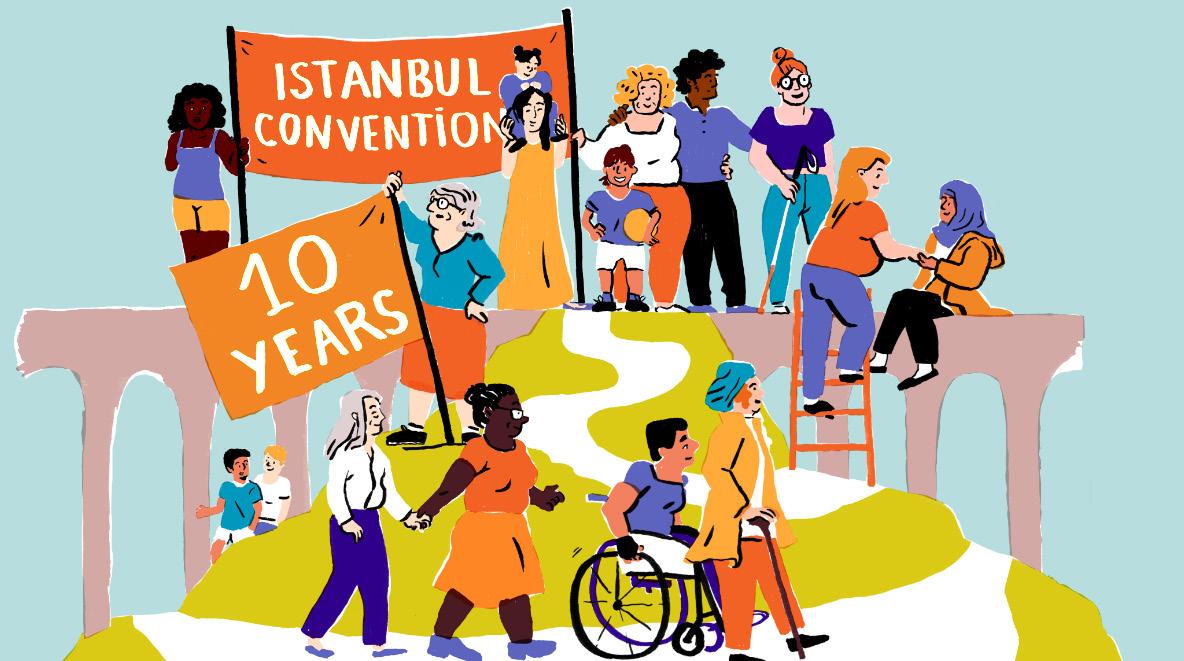
Motley Staff Writer Ava Somers delves deep into what the Istanbul Convention is.
Content warning: This article contains discusSions of domestic violence, violence against women, gender-based violence, sexual asSault and rape which readers may find distresSing.
The Convention on Preventing and Combatting Violence Against Women and Domestic Violence, better known as the Istanbul Convention, was signed in May 2011. After many years of a complete policy vacuum in Europe surrounding gender-based violence, in 2014, finally, this was put in place. Its stipulations, its benefits and where it may be amended in the future to better represent civilians are complex in an ever-changing world.
Firstly, what does this Convention actually do? Gender-based violence has been an international issue for time immemorial. For a long time, it was not even recognised as a problem, let alone something which needed to be recognised as illegal. Considering that all women were firstly property of their father, and later property of their husbands once they were married, an offence committed against a woman was not seen to be committed against her, but actually seen to have been an offence against her husband. For example, the rape of a woman could only be taken to court as a damage to property offence. For this reason, marital rape was not recognised until the mid-nineties. For many years, these sorts of violations of a woman’s human rights were not seen as much more than damaging a car. In the past hundred years, women have finally begun to be recognised as individuals, and in my opinion, the adoption of the Istanbul Convention is the epitome of women’s rights in the modern world.
Now, time for some statistics: one in four women in Ireland have experienced violence by a current or former partner. It is widely known that the vast majority of domestic violence victims are women and children, although part of me questions whether this is due to the stigma surrounding male victims of assault (Maybe that is an argument for another issue…). There have been 244 counts of femicide (murder of women) since 1996, 63% killed in their own home, 87% of whom knew their killer. Current or former male intimate partners were responsible for 57% of these murders, and 43 of all the women murdered were between the ages of 18 and 25. 47% of women in Europe between the ages of 18 and 29 had experienced psychological abuse by a partner from the age of 15; While 6% of all Irish women have experienced sexual violence by a partner, 31% have experienced psychological abuse by a partner. 12% of Irish women have been stalked, and 41% of women have someone they are close to who has experienced gender-based violence. Worldwide, one in three women experience physical or sexual violence, mainly by an intimate partner, but less than 40% of these women seek help of any kind, and 42% of women who do experience a form of intimate partner violence later report a resulting injury from this relationship.

So, what is gender-based violence? Well, genderbased violence is, you guessed it, gender-based. But what does that mean legally? Gender-based violence is generally perceived to be acts of sexual, emotional or physical violence against a person due to or based on their perceived gender. These new laws are aiming to eliminate this issue, or at
empowerment of all women and girls throughout Europe by allowing them to be themselves without the Sword of Damocles hanging over their heads as it has been for generations.

So, what does this mean for Ireland? Well, not much… yet. We have signed this treaty, but most of the laws still need to be implemented in Ireland or were already before this Convention. As far as I am aware there has not been any case involving the rights bestowed upon women by the Istanbul Convention. However, it will not be long before these cases come to the forefront, as
In my opinion, this move towards eliminating gender-based violence is a giant leap in the right direction. based crimes will lead to an awareness not previously there. This in itself will lead to a need for further education on behalf of the country, as people will need to be made aware of what these offences are. It will also not only discourage perpetrators, but will support survivors, as their specific experience is now recognised as a crime which occurred against them. This is a realistic and forward-facing law, as it entirely disregards the shame or normative attitude about these crimes being perpetrated against women. Women are edging ever closer to living in a world that is a safe and happy place for us to live out our days in peace without the threat of violence against us
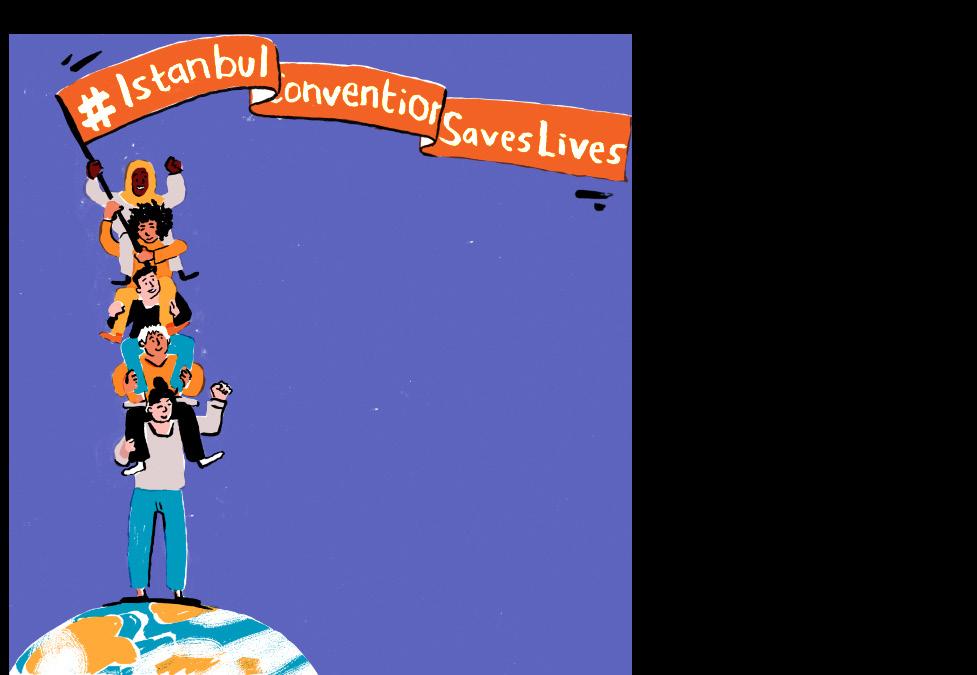

Motley contributor Ava Somers writes about how the Gender Pay Gap is alive and well in Ireland. `
What if I told you, you could earn less because you have brown eyes? Are less than 5’ 5”? Have blonde hair? Welcome to the world of women, where we earn less simply for not being given the correct gene.
In the famous words of James Brown “It’s a Man’s World”. Nothing could be more obvious to a woman in Ireland in 2023, and the Gender Pay Gap is no exception to the man’s world phenomenon. Currently, the Gender Pay Gap in Ireland stands at 14.4 percent. While this is slightly lower than the EU average, this is still a stark statistic, when considering that men are being paid almost fifteen percent more than women, simply by being born male. This has fallen in the ten years from 2007 and 2017 by just over three percent, but this simply is not moving quickly enough. The fact is that women have been excluded and discriminated against on the basis of having two X chromosomes for about 10,000 years. The rise of societies, division in class and many other factors have been raised as reasons; smaller brains, broader hips, frailty, and housework that needs doing have been given as excuses. But in 2021, the Irish government finally passed the Gender Pay Gap Information Bill, enabling women to begin on their journey to correct this injustice.
Not only is the lack of equal pay in equal roles troubling, but there is also the issue of male employees gaining better promotions within the workplace than women. This, however, has had in recent years, the kind of overhaul one could only wish to see in the Gender Pay Gap. The Promotion Gap within the EU in the ten years leading to 2011 stood at 36 percent but decreased to just eight percent after 2011 – a decline of about 80 percent. If there were to be a similar decline (of 80 percent) in the Gender Pay Gap, this would leave the Gap
at only three percent. This would see the average monthly female wage rise from € 2808 to around € 3145, while the average male wage is currently at € 3423. While women would still be receiving on average € 278 less per month, it definitely would be a step away from the € 615 less per month women receive currently.
This huge gap in pay is detrimental in many ways to our society. Firstly, it discourages young women from joining the workforce. Why on earth would a woman of the same level of skill and knowledge to her male counterparts even attempt to join a workforce to do the same job as her male counterpart, for 85.6 percent of his earnings? This causes even further issues, as it also affects the education system; Why would a young woman strive to go to college or university, pay the same fees as her male counterpart, do as many lessons as her male counterpart, work as hard as her male counterpart- to go on to do a job where she will be paid less? This discourages young girls from joining the workforce. This may be the reason that only 43.9 percent of women are in full time employment, in comparison to 60 percent of men.
This also has a massive effect on families and equality for children. Around 90 percent of singleparent households worldwide are headed by mothers; only 10 percent are headed by single fathers. The problem here arises where families are headed by a single mother and are then expected to get by on far less income than if the household was headed by a single father. Therefore, a household headed by a single mother, bears less of a chance of her children pursuing higher or further education, as their family will not have the funds to grant such access. They will obviously miss out on other opportunities throughout their youth, any activity being above the means of the
family, such as foreign holidays resulting in less knowledge of culture, financial pressures may push them to drop out of school early, a need to provide for their families is a responsibility which they should not have to take upon their own shoulders. This is a vicious cycle: a single woman who cannot afford to raise her children due to the discrepancies between her pay and that of her male colleagues- has a daughter, that daughter must drop out of school as her mother cannot afford third level education and she must help provide for her family, she is paid less than her male counterparts, if she has a family without a male partner, she may have to ask her daughter to drop out of school or cannot afford to send her to college, and so she sends her out to work to provide for her family’s basic needs and the vicious cycle continues. This sets up a very troubling narrative indeed.
This is also showing favour to some types of marriages over others. Taking lead from the averages outlined above, lesbian couples will bring in on average € 337 less per month than a straight couple, and € 674 less per month than a gay couple. This shows once again the huge discrepancy between families based on their gender alone. (Going on average figures, a lesbian couple has an income of € 5616, a straight couple of € 5953 and a gay couple € 6290). So not only are we discriminating against women solely, but we are also actively discriminating against certain family structures too (i.e. single mothers and lesbian couples).

How does one go about solving this? Well firstly, in my opinion, should men and women both be
offered the same opportunities (while women are statistically less likely to apply, this may come from the current ideology that “it would only be given to a man anyway”), with the same pay checks, more women would be able to sustain themselves and their family. There would be no discrimination between same sex couples, or in fact any couples, because each person working the same job would be afforded the same salary. This would also close the gap between male and female headed single parent families, as once again, there would be equal pay for equal work. This would then encourage more young women to seek higher education and give children from single parent households (regardless

before the law. The Employment Equality Act 1998 and the Equal Status Act 2000-2018 prohibit discrimination on the following nine grounds: gender, marital status, family status, disability, age, religion, sexual orientation, and membership of the travelling community. The Gender Pay Gap encroaches on at least three of these prohibitions (namely gender, family status and sexual orientation). This is also in violation of the UN Convention on the Rights of the Child, as under Article 2 “States Parties shall respect and ensure the rights set forth in the present Convention to each child within their jurisdiction without discrimination of any kind, irrespective of the child's or his or her parent's or legal guardian's race, colour, sex, language, religion, political or other opinion, national, ethnic or social origin, property, disability, birth or other status.”
of gender) a better hope of receiving third level education. Having more qualified young people in the country is better for building a better economy. If we had a better economy, we could afford to pay people more. The increase of women in the workplace would hinder any possibility of the re-emergence of a gender-biassed norm. Now is that not a much nicer narrative?
According to Bunreacht na hEireann Article 40.1 “all citizens shall, as human persons, be held equal before the law”. At least in this regard, the men and women of Ireland are not held as equal
Women have technically had the right to equal pay – at least in theory – since the 1970s. The societal ideology of women as third-class citizens has diminished into practical non-existence; the wages we receive should reflect this. The thoughts of discriminating against people of ethnic minority, sexual orientation or belonging to another social minority, is revolting to the vast majority of society in 2023, but the grounds of gender have yet to be seen in this light. This affects so much more than women, this affects future generations, broadening the economic inequalities already present in the State.

(WARNING: CONTAINS SPOILERS FOR THE LAST OF US AND THE LAST OF US: PART II.)

Though fans of The Last of Us franchise today may be more familiar with the HBO television series adaptation, 2013’s Game of the Year and IGN’s winner of Best Narrative was already breaking barriers and telling the story we have all come to love. The DLC, The Last of Us: Left Behind (2014) however, was met with a little less excitement despite its captivating fight scenes, attention to detail in the setting and providing more backstory for main character Ellie prior to the events of the first game. Why? Because fourteen year old Ellie, our beloved foulmouthed badass, was canonically shown to be a lesbian. This was a bold move from the game’s writer Neil Druckmann, who knew it would undoubtedly create backlash, especially among a dodgy group of straight men who loved the game and had already sexualised Ellie despite her being a child.
 STAFF WRITER JESSICA ANNE ROSE EXAMINES THE LAST OF US AND ITS PROTAGONIST ELLIE THROUGH THE LENS OF FEMALE QUEERNESS.
STAFF WRITER JESSICA ANNE ROSE EXAMINES THE LAST OF US AND ITS PROTAGONIST ELLIE THROUGH THE LENS OF FEMALE QUEERNESS.
Ellie Williams is our protagonist for The Last of Us, its DLC and its sequel. She is scrappy and easily riled up, unafraid of violence, and a lover of terrible puns. She speaks without thinking, causing tension between her and other characters, but for a fourteen year-old orphan who grew up during a zombie apocalypse, she turned out pretty alright. She is fiery, she curses like a sailor and loves to challenge authority, but she brings comedic relief to a game set in such a dismal setting. As Ellie grows older and she is presented to us as an eighteen year-old in The Last of Us Part II, she retains her likeability and only grows stronger in her shooting and defensive abilities; she fights off hordes of infected, an entire camp of Rattlers, and her enemy’s friends by herself. I haven’t played any other game with a female protagonist who relies on nobody but herself and succeeds in what she sets her mind to because of sheer


unbeatable entity - and you’re going to disregard all that just because she likes girls?

inevitably doomed to be bullied relentlessly online - particularly, I may add, for their appearancebecause they weren't the fan cast choice for Ellie or didn’t resemble the character enough.
audience whilst maintaining the core elements that made the original a success.
For the highly anticipated television adaptation, the search for the actress to play Ellie meant over 100 auditions, which is unprecedented for a video game adaptation.
Druckmann and television adaptation co-writer
Craig Mazin found their Ellie in nineteen year-old British actor Bella Ramsay. They’ve been in Game of Thrones, Catherine Called Birdy, and listen - I trust Neil Druckmann. He built the complex and haunting universe of The Last of Us, he wrote the characters’ incredible stories and
The character in question is not based on a real human’s face model. She is entirely made up by the game designers, and with 2013-era graphics, doesn’t have normal face proportions. So nobody was going to look exactly like our loveable lump of pixels in the first place. Nobody was ever going to be perfectly ‘right’ for Ellie as for over a decade she had become so adored by players who became protective of her. Which is fair, as we’ve seen the Uncharted adaptation and we all know how miscasting can destroy the integrity of a series and its stories. I knew nothing about Ramsay as an actor, a person, or whether or not the series would live up to the game’s reputation or not. But as Dr. Miranda Corcoran says in her module on adaptation - an adaptation is not meant to replicate its original. It is meant to connect with a new
And despite the hatred that was spewed at Ramsay throughout filming and premiering, they have won over the audience with their magnificent acting, not by trying to be the Ellie voiced by Ashley Johnson, but by creating their own interpretation of the character that is equally as adored. The cherry on top for me is that Ramsay identifies as non-binary and wore a chest binder for 90% of filming - something her co-star Pedro Pascal, who plays her father figure Joel, is said to have personally really helped her with. (And before you say that’s why they got the role; they revealed this after the series was released and critically acclaimed.) So despite the sexualisation of Ellie’s character, and trolls online who have attempted to erase Ellie’s identity as a lesbian over the past decade, she remains a legendary character we would fear insulting. Why shouldn’t a female lead in a video game be so incredible in all aspects and also happen to not be interested in men? Thanks to the tenacity of writers like Neil Druckmann, actors like Bella Ramsay who embody these women for us despite vile online trolling, and the women like myself who love video games they can see themselves in - characters like Ellie Williams exist. Clicker-slayer, brick-f*ckingmaster, Ellie Williams, who just so happens to be a lesbian, but for once, that is not the most ‘revolutionary’ thing about her.


Breaking Bad is deemed as one of the greatest television series of all time. The universe, which features the prequel series Better Call Saul and a follow-up movie (El Camino) to the original show starring Jesse Pinkman is a global sensation. Vince Gilligan created a masterpiece and brought it to life with a brilliant cast including Bryan Cranston, Aaron Paul, Bob Odenkirk, Jonathan Banks, Dean Norris and Betsy Brandt. Now, I could genuinely write thousands of words concerning what is probably my favourite show, but today I’m going to be focusing on a certain character: Skyler White.
You might’ve noticed up above in my cast listing that I missed out on a major actress who plays the show’s main female character. That is none other than Anna Gunn. Unfortunately, she has not been treated well by ‘fans’ of the show, particularly male viewers, and she continues to be verbally abused online to this day for her portrayal of Walter White’s wife.

To offer a quick summary to those of you who are unfamiliar with the show, it focuses on chemistry teacher Walter White, who, after being diagnosed with cancer, enlists (he blackmails him, let’s be honest) former student Jesse Pinkman to assist him with making and distributing crystal meth. Like many men with power, it quickly rushes to his bald head, and he does not stop when his treatment costs are paid for, oh no. He reigns hell on Albuquerque, killing people, blowing up a nursing home, poisoning children, and the list goes on and on… all the while tearing his family apart. Skyler, his beloved wife, is in charge of holding down the fort, despite being heavily pregnant (later on she almost single-handedly raises the newborn), working, and caring for their eldest son. But after all of Walter White’s crimes, and being the antagonist of the series, Skyler White is still the most hated character. She faces a seemingly ceaseless parade of misogyny that does not relent. The internet mocks her appearance and weight gain, and they take delight in the moments when her intimidating, murderous husband stares her down and snarls abuse through his gritted teeth. Why? Because she’s a woman.
Throughout the five seasons of the award winning series, Skyler could do nothing right. After Walter missed the birth of their newborn daughter due to a drug deal that he had organised, Skyler begs him for a divorce and refuses to let him within the house. She soon discovers her husband’s crimes and promises to never speak a word about his upcoming drug empire if he would simply leave her and her children alone. A simple enough request, if you think about it. Walter, being the fierce chemistry teacher that he is, desperately tries to blackmail her, pleading that his family is the reason that he is doing all of his illegal business. After she doesn’t budge, on the basis
of wanting her son and daughter to be safe, Walt forces his way back into the house. Just like the big bad wolf, his presence is threatening and he emits a dangerous aura, keeping his drug money stored in the walls of their house, metres away from where his infant baby slept.
Skyler’s act of rebellion against Walter’s manipulation was to sleep with her boss, Ted, a man who had harboured feelings for her in the past. Despite the fact that he flirted with her years ago, she constructed an extremely professional boundary between them both, her eyes set on her loving husband. However, she finally decides to embark on a physical relationship with Ted, a man who genuinely was attracted to her. For many watchers of the show, this pivotal moment declared what they were writing online for years: Skyler was an unsympathetic woman who, while her poor husband slaved over his chemistry instruments all day, decided to have an affair (they put it in less polite terms, believe me). The concept of Skyler seeking notice from another man was blasphemy, while Walter murdering men in cold blood was badass. She exercised the only agency she possessed, after everything else had been stolen from her by a man, in turn, she took what pleasure she could from another. In recent years, the question of whether Skyler actually had an affair has been posted online, and the results have gradually started moving in her favour. While she had sex with Ted, beforehand she had publicly announced, multiple times, that she no longer wanted to be Walt’s wife. She even had the divorce papers ready for him to sign and begged him for his signature, while he revelled in her misery. How can it be considered a relationship, let alone a marriage, when one of the adults no longer consents? If anything, while the show takes a stab at the failing American healthcare system, it also raises some queries regarding marriage.
Between the two of them, Walter is the abuser within the relationship. He is an insecure character who cannot even conceive the notion that what he is doing could potentially be wrong. Eventually, Skyler is emotionally beaten into submission and falls behind the drug lord, agreeing to launder money for him on the condition that their
children remain oblivious and safe. She offers money to her sister and brother in law after he was severely injured and could not afford his hospital bills, unable to bear witness to anyone she loved struggling. Whenever a sliver of doubt crawled within her mind, Walter’s threats rang in her ears, and now that she had implicated herself, what could she do? Her character was once again berated by aggressive viewers for activities that were less harmful than Walter’s. If she had handed him in to the police, which she repeatedly attempted to convince herself to do, fans would be outraged. Their beloved fictional drug lord would be locked behind bars, nay a fedora atop his head. It would not be very masculine of him!
Like many women who unfortunately find themselves trapped in an abusive relationship, no option available to them is deemed as the correct one to choose. In Breaking Bad, Skyler and Walter’s situation is a bleeding red flag, and even though the nature of it is fictitious, if an overwhelming number of people side with the obvious abuser, what kind of message is being broadcasted? Especially to those in actual dangerous scenarios that may not be as apparent as a dramatised one. Walter is the image of toxic masculinity, violence and abuse, so when you see fanboys donning the infamous fedora, yelling his iconic slogan with glee that originated from a moment where he screams at his wife, what are women to think? An antagonist who was expertly written to not only be a horrible husband, and father, but also a murdering drug kingpin is praised worldwide for being easy to sympathise with and for being an excellent image of a powerful man. While a woman who rarely gets a grasp at power and attempts to hold her broken family together even if it kills her is the victim of countless online trolls and downright misogyny.

Anna Gunn wrote an incredible piece for the New York Times a few years ago in which she attempts to find the root of where the hatred for her stems from. It’s called ‘I Have a Character Issue’ and is an amazing read, I would highly implore you to check it out.

The side effects of taking medication can be the most daunting part about finally taking the big step towards medicating. The contraceptive pill usually comes with a collapsible leaflet that underlines the many possible reactions that can occur in your body just from taking what seems like an insignificant and tiny tablet. This can lend itself to the thoughts that squirm their way into your mind concerning the possibility that this type of medication might not work for you, and you will have to try a different variety, repeating the process over and over again. It can be incredibly frustrating and downright sorrowful to narrow down what works for you, especially with antidepressants.
While many shows and movies cover the actual topic of depression and mental illness, mainly focusing on the way it can put your life on a static pause, actually treating it is often something that occurs off screen. This can be with therapy, medication, and many other methods.
Bojack Horseman is an animated adult show created by Raphael BobWaksberg that has never shied away from showing the gritty realities that often happen behind closed doors. The show itself focuses on an alcoholic and drug-addicted horse who battles through his childhood trauma while simultaneously struggling with being forgotten about in the public eye. It is an incredible series that will have your heartstrings pulled taunt as you feel grief for a cartoon-talking horse that has the smooth voice of Will Arnett.
Alongside Bojack is a host of many other characters who are all battling individual issues throughout their lives. Diane, a woman voiced by Alison Brie who is hired to write a book around Bojack, quickly integrates herself as a main character among the ensemble. After going through a divorce, she separates herself from the more unhealthy companions, determined to find a fresh start. She wants to write again, but even with the support of a new partner, a relentless wall of writer’s block remains solid.

In season six episode seven, which is appropriately titled ‘The Face of Depression’, Diane struggles with receiving a diagnosis that she is, in fact, depressed. Despite her psychiatrist diagnosing her, she struggles to accept the fact that she has depression, sugarcoating it instead by agreeing that yes, she is a little depressed, but it doesn’t extend further than that feeling. She battles with the accusation, claiming that she doesn’t have depression, despite the unhealthy habits she
has drifted into, such as letting personal hygiene slide and smoking too much.
To her partner, she explains how she tried taking a certain brand of antidepressants back in college and disliked how they changed her as a person, dulling her personality and making her seem ‘less fun’ to be around. They also physically affected her body, causing weight gain and acne. Diane also confides that one of her biggest fears surrounding taking antidepressants is that she’s beyond help. And what if, despite everything that she tries, none of it helps? What happens after that?
In contrast, her ex-husband, Mr Peanutbutter, is applauded for destigmatizing mental health issues, despite not actually suffering from depression after a rumour swirls around that he attempted suicide. He then embarks on a tour where he is deemed the ‘face of depression’, and garners more appreciation due to his apparent braveness that he gleefully broadcasts. This scenario, when flipped to include a woman, can often garner very different responses of a negative nature.
Diane finally decides to take the massive step and gets her prescription for antidepressants filled. In the following episodes, Diane’s character model is slightly changed as she gains weight due to the tablets. However, it’s never once represented as negative. In the beginning, she struggles to remain consistent with taking her meds due to personal stress, even going through a small bout of withdrawal. Once she starts back on her tablets though, she feels lighter and clearer, returning to her writing in private, which allows her to examine her childhood trauma from an outside perspective and really delve deep into the feelings that she has always covered up. But overall, she’s confident that she made the right choice.
Seeing a character voice the worrisome thoughts that can occur when taking any medication, but specifically, antidepressants is an incredibly reassuring arc to follow. All of your concerns are extremely valid when deciding to test out something as important as a new or changed prescription, and the animated Bojack Horseman can provide the reassurance that you might be lacking due to worrisome thoughts. Do take care though, as the show itself covers issues such as addiction, trauma, mental illness, and more quite extensively through its six season run. It has somehow stuck with me as one of my favourite series though, which is great except for when I am asked if I am personally doing okay after rewatching it for the fourth time. Thank you for the incredibly valid concern, I promise I am fine, I am just a bit too emotionally attached to a self-destructive cartoon horse with a wonderful voice.
DEPUTY ENTERTAINMENT EDITOR CHLOE BARRETT EXPLORES HOW THE ANIMATED SERIES PULLS BACK THE CURTAIN ON WOMEN’S MENTAL HEALTH, WITH AN EMPHASIS ON TREATMENT AND MEDICAT

LISA AHERN WRITES ON FLEABAG’S TAKE ON MENOPAUSE.
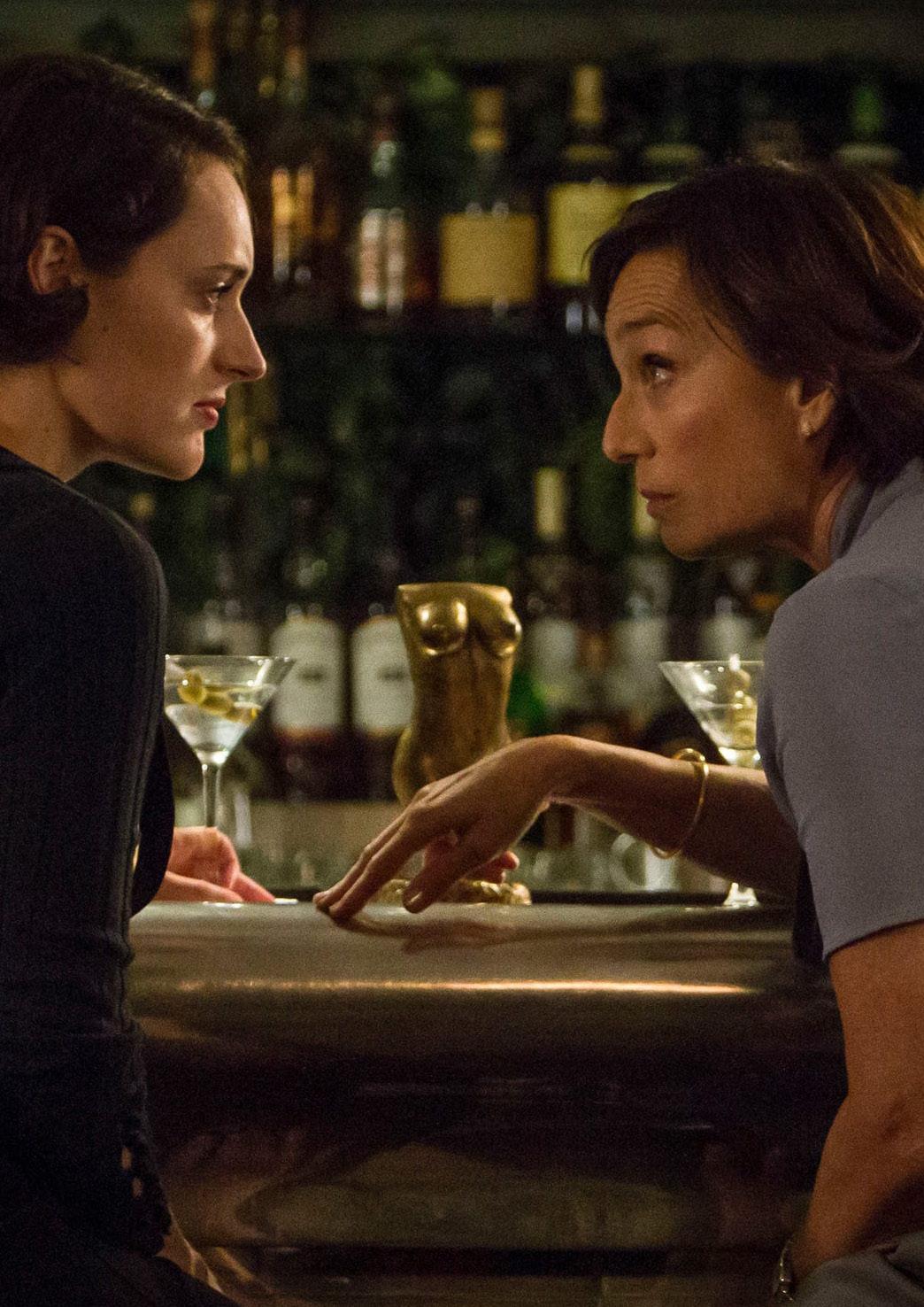
Menopause! A big, scary word that hangs over us young women throughout our lives. For a while, menopause was this unspoken topic that I rarely saw in the media; I had little idea about what was coming for me in the future. Luckily, Phoebe Waller-Bridge opened up this window where menopause was described beautifully yet honestly, normalising a word that seemed too daunting for mainstream media. She crafted a wonderful solique about menopause in season two, episode three of her award winning show Fleabag. The leading role of Fleabag, played by Waller-Bridge herself, meets with Belinda, portrayed by the talented Kristin Scott Thomas. What unfolds is a conversation between these two women about the retirement of a woman’s menstrual cycle. Belinda begins the conversation with how “it does get better”.
An insight is given into how “women are born with pain”, we as women carry pain with us every single day. We have period cramps, pains in our backs, our breasts are constantly aching. Men - cisgender men certainly - don’t have this. Belinda describes cleverly how men have to create these demons and gods and these wars to fight out. However, women are fighting their own internal war throughout their whole lives. “We have pain on a cycle for years and years” until… the MENOPAUSE. She describes to Fleabag how it is “the most wonderful fucking thing in the world”. She however does not sugar coat it, it completely sucks in the beginning. The physical aspect is utterly painful where your whole pelvic wall collapses and the hot flashes you experience are a bane that you must get used to. But her final insight for both Fleabag and the audience is how it breaks the cycle of menstruation. When we “are free”.
Throughout their lives, women are seen as these bodies that are used to create life. The menopause is a period in life where you are not expected to fulfil this job anymore. You are set free from a task nature applied to you. In Fleabag she describes how we are “no longer a slave… a
machine with parts”. Fleabag opened this opinion on menopause showing it as a beautiful freedom from pain that women alike suffer from day to day. This new vision of menopause has allowed women to see it in a new light. The HSE definition of menopause “is when a woman stops having periods completely. It is a natural part of ageing”. Phoebe Waller Bridge takes the “natural” part and creates this wonderful narrative of a woman’s menstrual cycle.
Before I watched Fleabag, I had not seen a great representation of menopause in media of all shapes and forms. One distinct mention I can recall is That 70’s Show where the mother Kitty has a storyline where she reached menopause, but they make it as part of a running joke. She has a “crazy” side simply because her changing levels of hormones have resulted in mood swings. In comparison to Fleabag, one can see that a change in menopause representation was badly needed.
However Fleabag is not the only player in the game. In the last decade there the floodgates have opened for the media's representation of menopause. The Bitch Is Back by Sandra Tsing Loh is an essay that went mainstream for its depiction of the ups and downs of menopause, which was then later staged as a play. This normalisation of the natural end of a menstrual cycle is an extremely positive outlook for the future. Hopefully more women’s health issues will become more mainstream as well.
The first time I came across Louize Carroll, I was about fifteen. I was beginning to play bass in a band with my friends, but had only ever heard of male bassists before that. I began looking into iconic female bassists such as Suzi Quattro, and then someone mentioned to me “Don’t the Blizzards have a girl bassist?” I have followed Louize’s work ever since. But what amazes me about Louize far more than breaking gender norms in her choice of instrument, is how she challenges the assumption that we, as people, must be one thing. Louize is not only a musician, she is a consultant psychologist, she writes for the Huffington Business Post, she works in a psychological capacity in the cases of child protection issues, and she is the director and co-founder of an online platform called Prism, which links consultant psychologists

registered in Ireland with people who are in need of their expertise. Regardless of which side you stand on the #GirlBoss debate, Louize’s accomplishments and successes make her an inspiration to young women in Ireland, and in my opinion, the perfect interviewee for this month’s Motley.
Prism was formed when Louize began publicly speaking about psychology, and began to receive messages from people wishing to see a therapist, but were overwhelmed by the sheer amount of answers provided when searching it on the internet. Louize still gets these messages to this day. She saw people who needed this help and decided to create a platform which can help these people. Prism also works to help people to link with a vetted therapist, to make sure that the people who wish to seek help are
linked to someone who matches the platform ethos and approach, to ensure that people no longer have experiences where they are linked to a therapist with whom they have a bad experience. Prism has now been running for a year, and the team has been working to “consciously grow, and not just populate” the platform.

I mentioned how the ideal woman online is always on our tails. “I find it really troubling, in a way that is not spoken about because that is a little intangible. The first time the ‘like’ button appeared in Facebook, that was when everything changed. We began posting through the eyes oof other people. That significantly changed our psyches. That was when we changed how we present ourselves to the world and why. There was always image management, but now our lives are geared around that, and not that fulcrum point in our gut. Value and recognition and reward is placed on people who present themselves in such ways.” I ask you, the reader, this: How often do you post something on social media, simply because you like it, and how often do you post something for “likes”, to make sure people see, or because it would make your life appear to be what you want people to believe it is? Or how often have you been discouraged because you did not get as many hits as you thought you would? How often have you opened a social media platform and left it in a slum or feeling like you are not enough? These are the side effects of social media. Louize explained that we, as young people, begin to assemble ourselves externally, for the validation of others, in a way that generally comes from a trauma response, and results in trauma. She calls it “the undiscovery of the true self”, where your life exists to make other people happy, by suppressing yourself to meet the needs of others. “Social Media is a gallery of a curated life.” She praised her work with child
protection for reminding her of what matters, when she sees that these children are not receiving the bare essentials.
I had to ask Louize about #GirlBoss and #Hustle culture which we see online. If you somehow have managed to avoid this, ‘Hustle Culture’ consists of so-called gurus, teaching us how to “Make Rest Productive in These Simple Steps” or “How I Got Rich Overnight #GirlBoss”. This is a culture which companies are now feeding into, needing their employees to be available at all times; this is a culture which wags its finger at rest and rehabilitation, and built itself around an obsessive need to always be productive. Louize’s advice was “Do it if you want to do it, sand you enjoy it, but understand the difference between being confident, taking risks and believing in yourself, and entitlement.” There is an overlap between.
However, her first thought was about how we have flipped the traditional roles of relationships. “I am seeing a complete flip of roles in relationships. These young men are really looking for intimacy, but all of the women that they are meeting are playing the old, traditional, masculine role, and they cannot navigate this. I wonder if these are overcorrections.” Louize’s advice was that nobody owes you anything, that people do not own one another; in relationships it is a choice for each person to show up every day.
“This ‘sticking it to the man thing’ feels like empowerment, but using the same tactics that were used on you to make a point, is not making a point.” This immediate cast my mind to the child who suffers bullying, but later becomes a bully as a way or overcorrection; for the people who hurt us to feel the pain, we must act in the same way and inflict the same pain, although we know that this is wrong.
Louize commented on the lack of humility which seems to be taking over at the moment. “It is important to know when it is time to voice your opinions, and when it really is not. Everybody feels that their opinion is fact, and this causes a lack of a shared reality.” Louize spent some time in LA over the past few weeks, and she was staggered by the reactions of people there. “Whatever has happened in Ireland in the past few years has not happened in LA.” We spoke for a while on how Irish people have closed themselves off from each other, Irish people are no longer playful, or curious. We seem to have lost our kindness in favour of being entitled and closed off. We do not seem to connect to other people as we once were.
I found speaking to Louize made me want to be a better person, and not simply to prove to the world that just because I am a woman and I want to break the stereotype, but she made me want to be a better person, because if each person took the time to be a little kinder, be a little more open, be a little bit more authentic - we can truly build a better society by simply working towards it individually. So be a little kinder, to yourself and to others. If you feel that you or someone you know may benefit from Prism’s platform, do not hesitate to visit https://prismtherapyonline.com.
Baneen Talpur discusses the popular television show and how it conquers sex related stereotypes that have plagued women for generations.
"Hold the flower in your hand Jane," Jane's grandma asks her. "Now crush it and bring it back together, you can't right? This is what happens when you lose your virginity, you CANNOT GO BACK." Jane is 10 years old when she makes this promise and it ends up affecting how she views sex for the rest of her life.
Jane the Virgin was revolutionary when it came to how women's sexuality is viewed on television. The show did not portray women as sex objects there purely for the pleasure of men, it depicted the Villanueva women figuring out their sexuality with their own voice. The show shows us some very common yet taboo topics surrounding sex and for a rare time, through a woman's viewpoint on what sex means to her.


Jane's promise to her grandma affects how she views sex for the rest of her life. Her promise to stay a virgin until she is married meant that lots of men gave up on relationships with her. There were also elements of catholic guilt as Jane comes from a Catholic family. We learn soon though that it is not entirely her grandma that is the reason behind her decision. Jane's mother Xiomara is a modern sexually liberated woman who got pregnant with Jane when she was 16 and while Jane knows her mother loves her, she feels she "derailed" her mother's life and does not want to end up like her. All of that goes down the drain though when Jane gets accidentally artificially inseminated and ends up a pregnant virgin.
The show discusses sex in a very nuanced way. It addresses themes such as shame and how to overcome that, problems associated with it and guilt that women often have to deal with for liking or wanting sex. As the show progresses we see Jane's sexuality go from fear, denial, temptation, negotiation, acceptance and finally liberation.
We get to see Abuela's strict views on the matter emerge from her past when she was shamed on her wedding day in 1970s Venezuela by her sister that she had sex outside of marriage. Viewed as a major sin, Abuela was shunned and did not want that for Jane. Abuela's strict views lead to Xiomara's rebellion as Xiomara chooses to have sex with whoever she wants guilt-free. She engages in it casually and we see her character as a flirtatious, confident and brave woman who never shies away from the topic.
With her mother and grandma on opposite ends of the spectrum, Jane is stuck somewhere in between. Having lots of desire, romanticizing life and wanting to be loved but also haunted by the promise she made, every encounter that could become sexual turns sour reminding her that she is not married. The show perfectly captures how ingrained the idea of a "pure" woman is in religious culture and how it can affect someone's sex life for years to come. Even when she finally did get married and could have sex, she was too "in her head" about it because the guilt still haunted her, years later. Many women from all over the world still have to deal with this type of thing where they have been policed their whole life about their sexuality and it takes a lot to overcome that guilt and shame. When Jane loses her virginity she feels like she has lost a part of her
identity and faked her orgasm. It takes time for her and discussion with her partner to figure out what she likes in the bedroom. Sex has a huge mental component for many women and so Jane's journey from being scared about it to being vocal and actively engaging in it is refreshing and liberating to see. Jane's mother reassures her that she has not lost a part of who she is, she has gained access to a new dimension of herself. The series explores many aspects of desire from women also having sex dreams and enjoying fantasies to sexting and figuring out masturbating. This is seen when Jane who encourages Abuela who has been celibate for over thirty years is worried she may not be able to like sex again, to buy a sex toy. Viewing older people as human beings who are entitled to desire and pleasure was a fresh perspective to see on the show.
The show also should be commended for how it depicts LGBT relationships. The show was not shy in hiding how Jane found it difficult to come to terms with Adam, (her boyfriend at the time) being bisexual and addressed her insecurities being a straight woman who simply cannot give Adam "what a man could". Adam's character gave us a realistic insight into being bisexual that bisexual people are simply people who love without seeing gender and that each person that they love is different. Jane's experimentation with figuring out whether she could like a woman, or another character, Petra, finding out that she is bisexual as an adult (which is also not unusual in real life), was revolutionary on television as we are expected to know who we love earlier in life. Gay relationships on the show are seen as just another relationship, it does not look like many other tv shows where the characters are there just to tick a diversity box, but add real value to the storyline.

The show also tackles difficult subjects such as abortion and getting a mastectomy. Xiomara always enjoyed what her body gave her, such as pleasure and confidence. When we see her get an abortion because she does not want to have kids or her pain when she has to get breast surgery, we get to see how hard it can be for a woman who relishes in her desire and how health issues can come in the way of that.
The show captures the full range of complexity in female sexuality, something that we seldom see on tv. Jane goes from a woman who strictly waits until marriage to have sex, to a woman who is willing to have flings, overcomes the idea that she is too innocent to have it and finds the courage to chase her desires guilt-free. Women can learn a lot from watching the show, women waiting until marriage to have sex is not wrong, it is a choice. Women having lots of casual sex is not wrong, it is a choice. Waiting until marriage does not mean that a woman is a prude, she may just want to find something deeper and that's her right. Women who have lots of sex are not sluts, they have every right to access pleasure. Lots or none, we live in a hypersexualised society but with no actual realistic discussions about sex. We avoid the topic like the plague and are still riddled with shame instilled in women by the patriarchy. Jane the virgin faces almost every topic related to sex head-on, shame-free. Hats off to them for doing it.



The passing of Vicky Phelan in November shook the country. The intensity of the moment might distract you from the current work of Dáil and the HSE in improving the system, which was Vicky’s resting wish. To address this we investigated what is happening now and how it is informed by the CervicalCheck scandal. We spoke to Stephen Teap and Lorraine Walsh of the 221+ group about medical misogyny, the complicated history of the Patient Safety Bill, the controversial HSE media guide released and more. We also spoke to the HSE to learn more about how they are improving the services they provide in response to past events.
Like women such as Lindsey Bennett, Laura Brennan, Emma Mhic Mhathúna, Irene Teap, Ruth Morrisey and Lorraine Walsh, Vicky was not informed of the incorrect reading of her cervical screening slide until it was too late. An audit of the CervicalCheck programme slides in 2011 uncovered false negative results of cancer with 221 women affected. The scandal erupted due to the withholding of this information from the women affected.
Lorraine Walsh
Motley spoke to Lorraine Walsh, a Mayo native who lives in Galway with her husband. In June of 2012, Lorraine was diagnosed with cervical cancer at the age of 34. A year prior to her diagnosis, Lorraine had a routine smear test and had been informed that there were “low grade pre-cancer cells'' present in her smear test. When she returned for a follow up test, she received a call from her doctor informing her there were “high grade pre-cancer cells'' present and she required a colposcopy. Shortly thereafter, she was diagnosed with cancer. Following her diagnosis, Lorraine underwent extensive therapies and surgeries, and was thankfully cured of cancer. However, her treatment left her without the ability to have children. When she got the call to inform her that she was one of the many women whose slides had been misread, she realised that, had it been read correctly, she could have been diagnosed far earlier, and perhaps been left without the devastating life-long side effects of her treatment.
Since Lorraine learned that she was a victim of the CervicalCheck scandal, she has worked tirelessly as a patient advocate to fight for justice. Together with Stephen Teap and Vicky Phelan, she co-
founded the 221+ group to support victims and their families. Together, these three people, all affected by the failures of this system in their own ways, became highly involved in the investigations and legal proceedings that ensued after the scandal.
Speaking on the emotional and physical toll this level of advocacy took on her, Lorraine said “some days you just want to give up, but you can’t. I can’t do that”. The advocacy never stops, as she told us that she was heading to Dublin the following day for the vote on the Patient Safety Bill, which was being debated in the Dáil.
Initiated in 2019, this Bill aimed to legislate across the HSE which includes the National Screening Service (NSS). The central goal being the implementation of mandatory open disclosure. This is the obligation of a healthcare professional to share a mistake committed with their patient. The December 2022 Dáil debate featured TDs pushing back at the meagre two hours the Bill had been given to debate and the lack of consultation with the 221+ Group. Minister for Health Stephen Donnelly was proposing a system of patients triggering reviews of their slides rather than an automatic system. However, no legislation was in place for the obligation to inform patients of this right. Legislation for mandatory open disclosure was looking unlikely.
When asked about the levels of sexism Lorraine was exposed to throughout her experience, she noted that she never felt as though she was a victim of sexism. This all changed, however, when she began working as a patient advocate. When referring to the meetings that were held with politicians and the HSE, Lorraine mentioned the “many, many times” that she would ask Stephen Teap to speak on her behalf as she felt as though her voice was not listened to.
Lorraine had an extremely positive experience during her treatment. However, since the formation of the 221+ group, others have been questioned on their associations with the group before clinicians decided to treat them. One woman stated: ‘I’ve been treated like a leper’.
Stephen Teap
Motley also spoke to Stephen Teap, widower of the late Irene Teap. Stephen lives in Cork with his two sons Oscar and Noah. Irene passed away in 2017 after a diagnosis of stage two cancer. Her two cervical screening slides were misread in 2010 and in 2013. It was not until 2018 was Stephen informed, through a phone call from the HSE, that Irene’s slides were misread. In the High Court in December 2022 Stephen received an admission of liability and causation from the two labs involved and from the HSE.
Speaking on the Patient Safety Bill over Zoom, Stephen explained he would be measuring the legislation using the ‘Irene Teap’ test. “Will [the patient] get disclosed to? Regardless of if it is done anonymously in an audit or if she opts in but will they be getting disclosed to. Irene should have been given that right to know before she died.”
In February 2023 Minister Donnelly accepted amendments to the Bill. There will now be an obligation on healthcare professionals to inform their patient of their right to a review of their slides. When we spoke to Stephen Teap the 221+ group had in previous days contacted the Minister and were then in consultation with the government right up until 10am the morning the Bill passed. Later speaking on Today with Claire Byrne, Stephen praised the respectful nature of the debate and expressed his relief that the legislation passed.
‘CervicalCheck is not the same programme that was reviewed back in 2018, but there is certainly a hell of a lot more to do’. Stephen commends the restructuring

of the programme as well as people in the HSE he has worked with on various committees for their passion and commitment. However, he is not satisfied that the HSE has communicated its fault in the CervicalCheck scandal effectively to the public. “In order to say we are wonderful today, and we’re going to be even better tomorrow, you have to say, we’ve learned so much yesterday. The beginning steps of trust is acknowledging what happened in the past”.
Both Stephens and Lorraine’s comments are echoed in the inquiries into the programme since 2018 by Dr Gabriel Scally. As of his latest report in November 2022, Scally is now confident of the safety of the screening process. He also states that there is a lot more to be done especially surrounding the culture of open disclosure.

In September the HSE Press Office released a media guide which Stephen described as a “rewriting” of the CervicalCheck scandal. It was produced for academics, broadcasters, journalists and commentators. According to The Irish Times the guide stated that ‘no lives were put
at risk’ by CervicalCheck.The media guide is no longer being circulated. When we asked the HSE about the media guide, they told us that the media guide “is set to be updated with input from the 221 group”. However, the question must be asked: is this how we build trust?
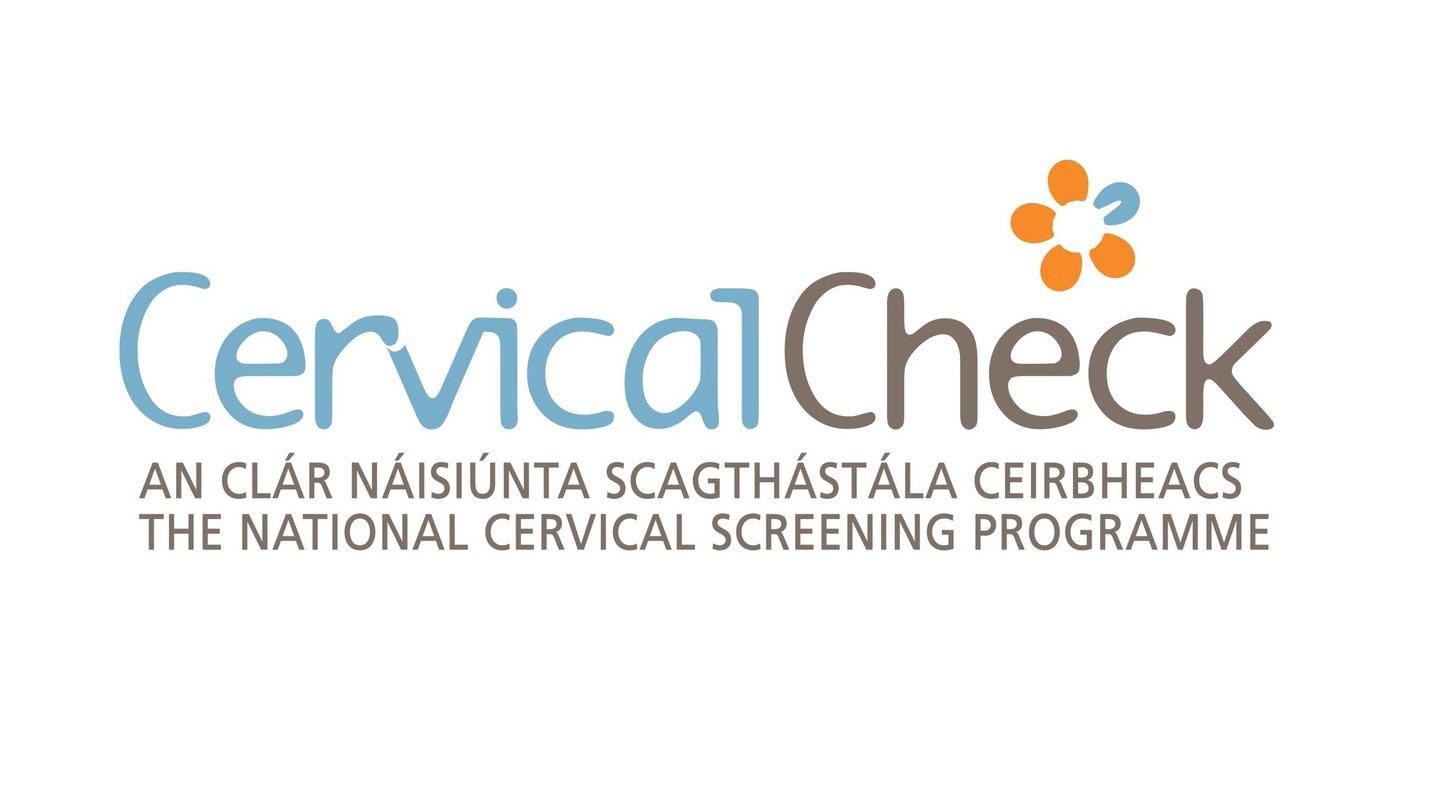
The patient-triggered review of slides is the greatest success of this story. Speaking to the HSE Press Office, they told us “The NSS will soon implement a new personal cervical screening review process, which has been created with women and families affected by interval cancers”. Dr. Scally’s recommendations focus on the development of an Irish National Cervical Screening Laboratory. In December 2022, the lab processed its first samples for the programme. Dr Aoife Doyle, Lead Pathologist has stated that “it’s a lab that’s very much wanted by the Irish public and by scientists in Ireland, but it’s not about doing it quickly, it’s about doing it correctly”. Although ensuring that this is done correctly is paramount, it is also vital that this process is expedited to ensure that we do not repeat the mistakes of our past again.

Formed in late 2021 at MTU Cork School of Music, six-piece indie rock band Staff Party have gone from strength to strength since their first sold-out gig in April 2022. Staff Party are characterised by their energetic live performances, nostalgic yet innovative fusion of indie and dance-punk, and their refusal to take themselves too seriously. The band has played at a number of venues in Cork, including Crack Jenny’s, KINO and Winthrop Avenue. At the time of writing, they have racked up almost 3,000 streams on their debut single ‘Solo’, and have kick-started 2023 with a slot at the UCC Science Ball and their first festival gig at The Next Big Thing in Dublin. I caught up with Jamie Kierans (vocals), Alexa Newall (vocals, synthesiser) and Daniel Maguire (guitar) to chat about the band’s musical identity, performing postlockdown and their 2023 plans.
You’ve been gigging pretty extensively since your first performance in early 2022. Do you think performing live has influenced your creative process at all?
Jamie: I’d say so. I’d say the tunes that have been written since we started performing are more fun and energetic.
Dan: It’s probably true to some extent, we had actually rehearsed for months, nearly a year before we started gigging because of COVID. We had some more soft rock stuff, but the ones since we’ve been playing live have been more mental.
Alexa: Yeah!
J: Not even just the new songs, but the songs that we were already playing are now different. Even if we haven’t even necessarily changed the parts or changed the song, it all sounds different.
D: We all try to one-up each other onstage, like, who can be the most mad.
And would you say you’ve factored that into the writing process of, say, crowds tend to like this, let’s incorporate it?
J: To be honest, not really. When I started writing songs I always wanted them to be for live music anyway. And the idea of a chorus people can enjoy and get involved
with without necessarily knowing it was always the most appealing thing to me—making music that someone didn’t have to know to be able to enjoy. Our most recent song, “Magic Man”, didn’t exist before we started gigging, and now it’s one of my favourites to do live ever because it’s purely about craic. It’s not like you sit down and write a meaningful song—it’s purely one that’s just supposed to be good fun.
If you could put on a gig with any artist, big or small, who would you choose?
A: Earlier I saw a Tyler the Creator Tiny Desk concert. He’d be great. Destiny’s Child, Tyler the Creator and Staff Party, what a f***ing lineup.
J: LCD would be unreal.
D: If we’re going the full dance punk route…yeah LCD Soundsystem…My answer is going to be Talking Heads. The energy they bring is something we want to emulate. It’s second to none.
A: Seriously, I would say Everything Everything. They’re great boys, it’d work very well and they’re unreal live, too.
J: I would say Cage the Elephant. When I went to see them, that was when I realised how I wanted to perform. Best gig I was ever at in my life. They hadn’t played Ireland in years and I loved them so my mother got me tickets to see them in Manchester. Their frontman’s energy is ridiculous, it’s feral, it’s like he’s not human when he’s performing. I saw one clip of him before where he went crowd surfing.
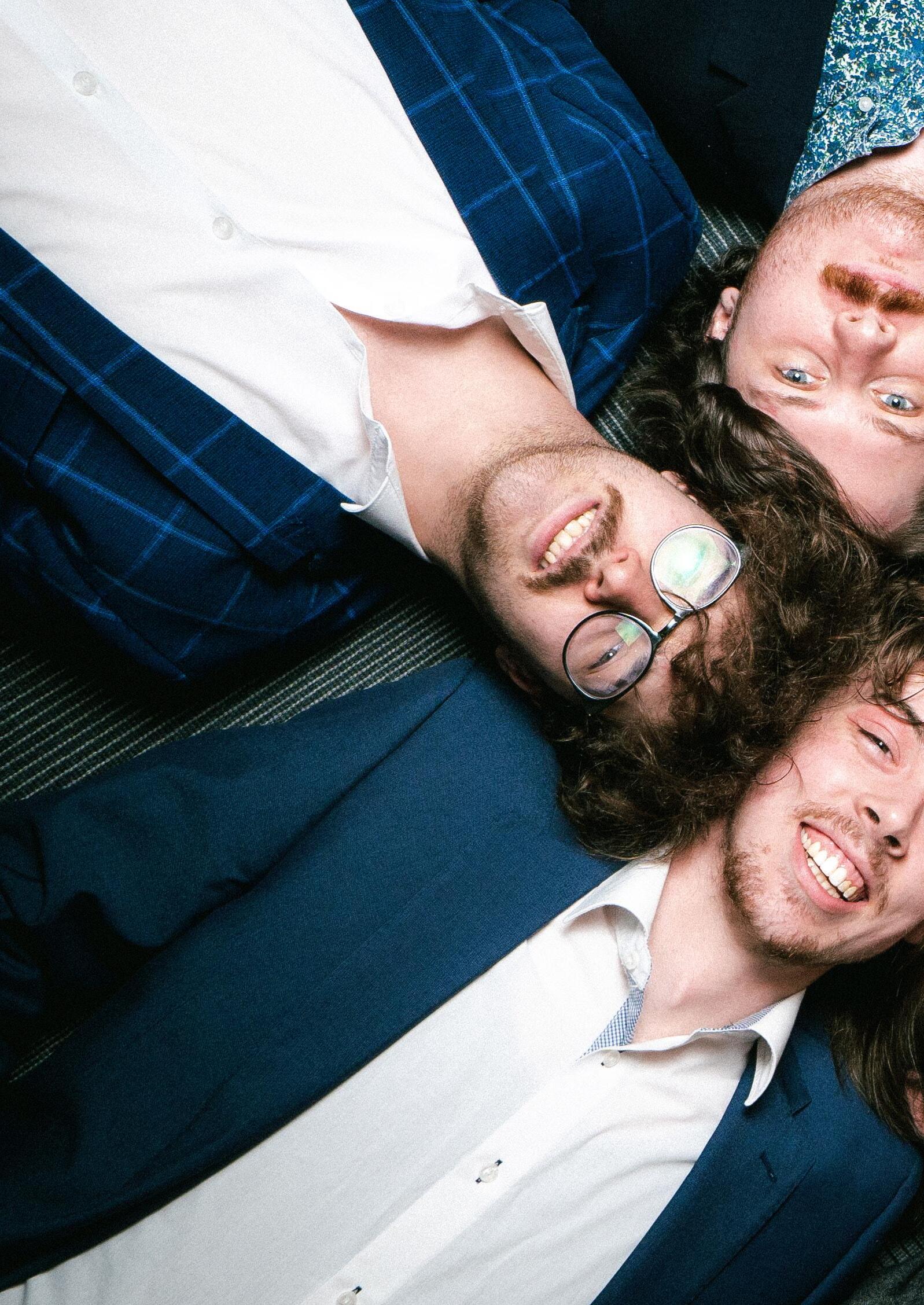
D: My joke answer for that would be Death Grips, or Kero Kero Bonito.
A: Kero Kero Bonito would be so funny.
Would you be able to talk me through your main influences starting out, and if anything you’ve picked up along the way or bands you’ve played with have influenced your music?
A: In terms of performing I think it’s weird because we bounce off each other with how we perform. We give off so much energy and we work really well together and we don’t really think about what we’re doing, we just go a bit mental. It’s like, (jokingly) “oh my god, we’re each other’s inspirations!”
A: It’s very much like, I’d be watching everyone go mental and obviously I can’t but I’m just there with my keyboard like woo!
D: I do think the songwriting, a lot of it comes from indie rock stuff, like The Strokes and The Arctic Monkeys a bit. But then it’s been more influenced by the dancey stuff like LCD Soundsystem and Talking Heads and that kind of thing. In terms of local bands, the fact that we had two members of God Alone in our band didn’t hurt in getting more noisy stuff in there. Me personally, any of the guitar parts I’ve come up with have been very influenced by Johnny Marr of the Smiths.
J: I had very narrow influences before. I would just try and copy The Strokes and The Arctic Monkeys, I love bands like Fontaines D.C. and Blossoms as well. Indie rock and indie punk as well as synth-y stuff. Jake put me onto a band called The Rapture, which was a big eye-opener. I got big into Daft Punk and LCD Soundsystem as well as IDLE. In terms of performing—exactly what Alexa said—our band started from performing together in college. We were like, “This is energetic and sounds fun”. When we first played, we were like “Oh this is good craic” but it keeps going up a step.
A: It definitely helps that we’re all buds as well though.
J: The other day when we had two gigs in a row…That would have been absolute hell if we weren’t having the craic. It was a whole day that went on for like twelve hours.
D: It was great playing with Conor as well, finally. He’s been in the band for months but those were our first gigs with him. We miss Jack and we love him dearly but Conor’s a lovely lad. They’re both the best drummers. Chris is…
A: The best boy.
D: He’s kind of like…the dad. He does hold it down a lot when everyone’s being mental. He’d put together so much of the recording, he mixed the song, he’s just a legend.
J: He grounds it all.
What have you all been listening to recently?
J: Rowan. They’re from Cork and tick all the boxes that The Strokes do for me. They’re unreal musicians who could play whatever they want and they just make this unreal indie rock.

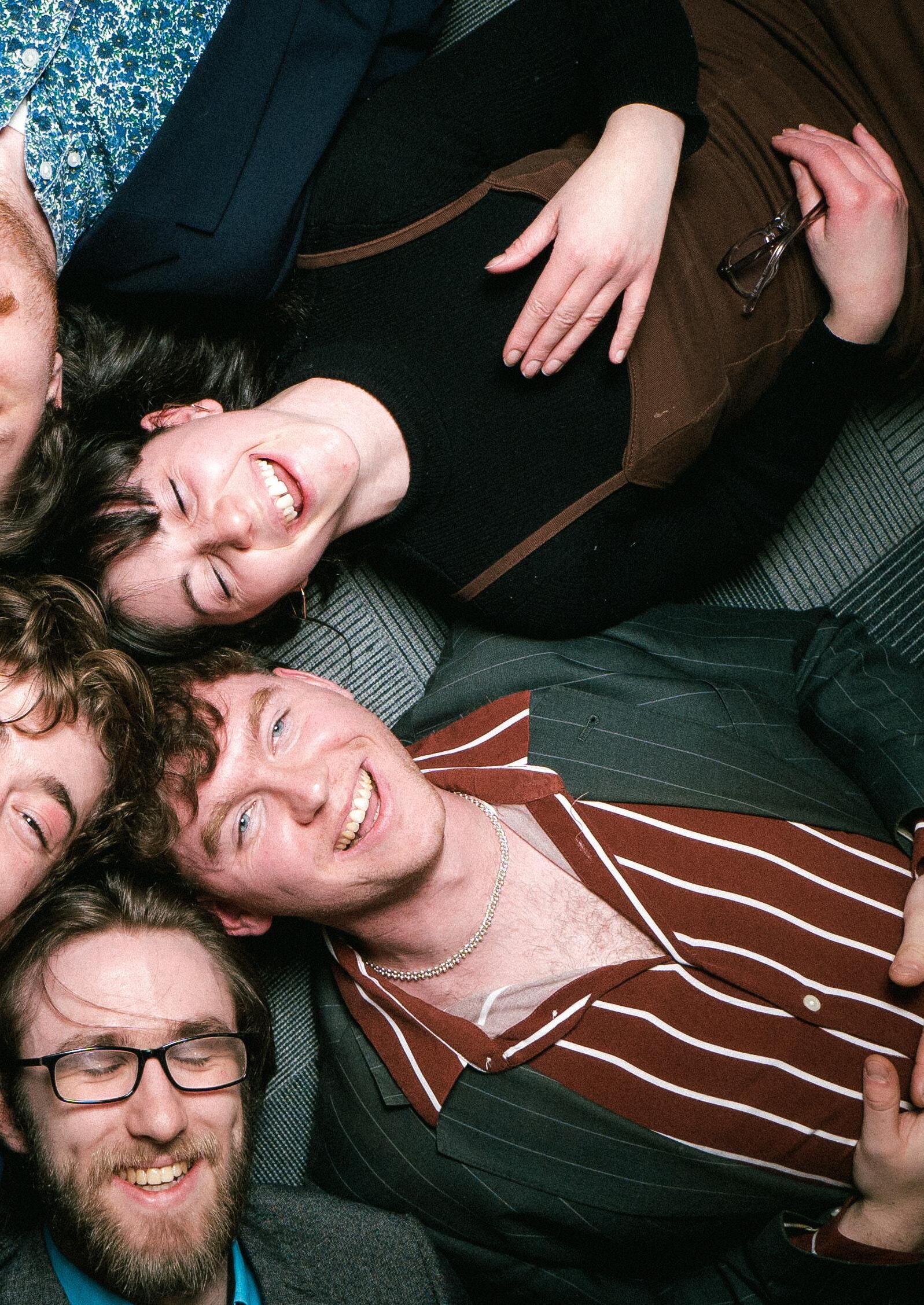
D: Talking Heads. And Vampire Weekend but that’s kind of a love-hate thing. A lot of Bjork as well. I’ve been listening to a big f*** off playlist of a range of like, Vietnamese folk songs and random stuff.
A: A lot of very obscure bleep bloop music, like glitch music. It’s by Alva Noto.

J: She’s our noise gal.
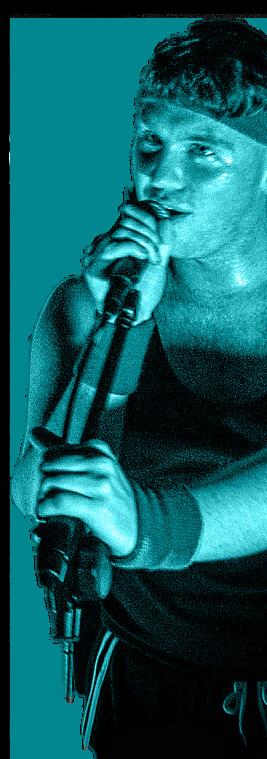
A: I am the noise gal. I’d be listening to it like “Okay, I’m going to try and implement this in the new stuff now”, because it is very cool. Also James Blake, he’s class. Great boy.
We’ve already seen you play UCC Science Ball and your first festival this year. What else can we look forward to from you in 2023?
D: We’d like to do stuff that’s not in Cork or Dublin.
J: I want to play Limerick soon. There are a couple of Limerick bands I’ve been eyeing up that look cool, and Galway has to be done. I’d like to go to the North. Maybe outside of Ireland. More counties and potentially more countries this year, and some serious recording.
A: Especially when we’re done with college this year.
J: Bigger tunes, bigger parties. That’s a pretty nice headline there.
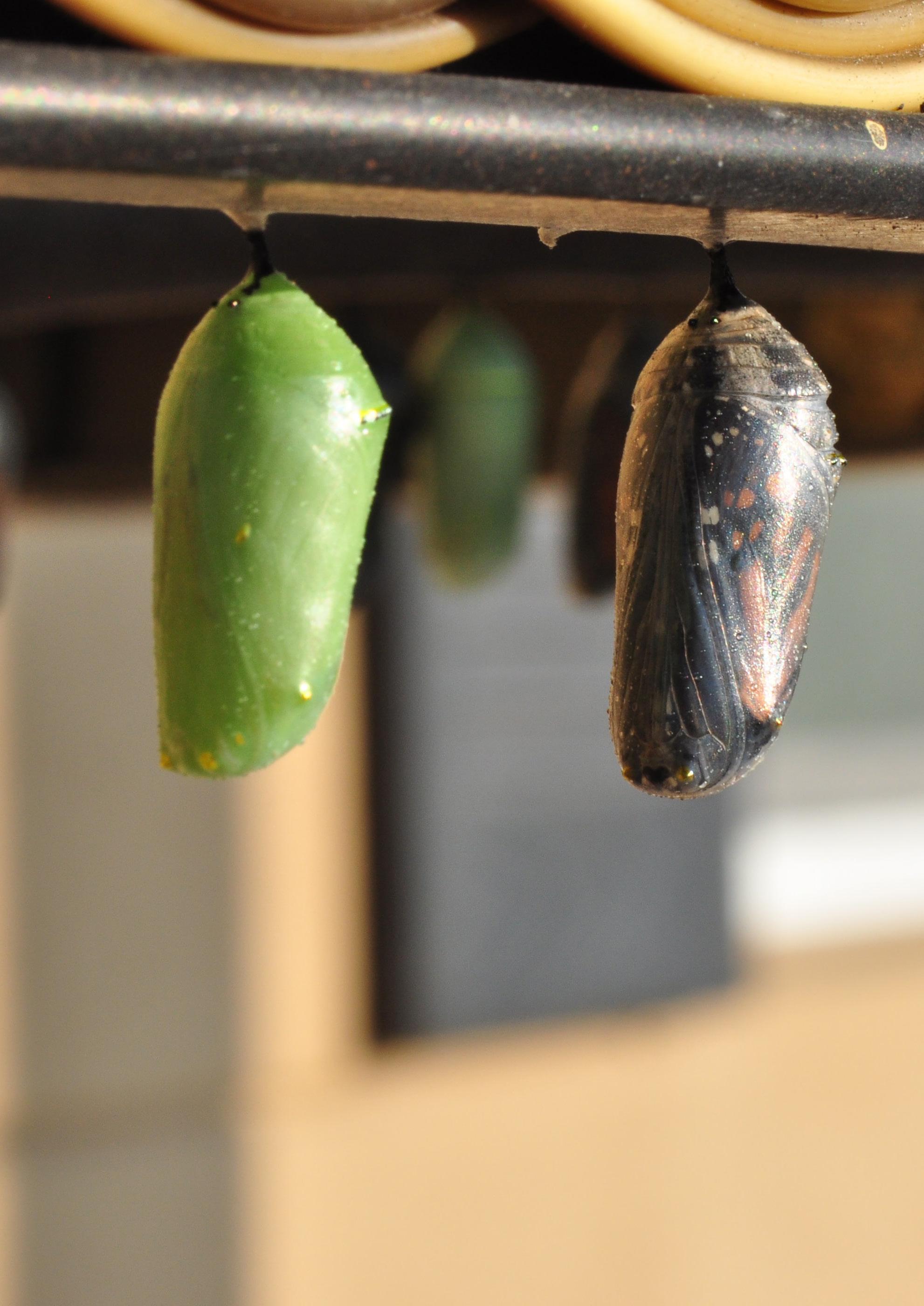
Sweet flesh transformed scraping teeth, dry eyes, flaking skin, skin so swollen trying to cope I feel the affects more than ever now something is growing festering
Eating and drinking and consuming my blood, my life, my energy, my calcium engorging my body, bursting my breasts ripping and tearing and screaming its way out of me They placed this bloodied mangled thing that wriggled on my chest scrapping for more, more more Happy Birthday, my child
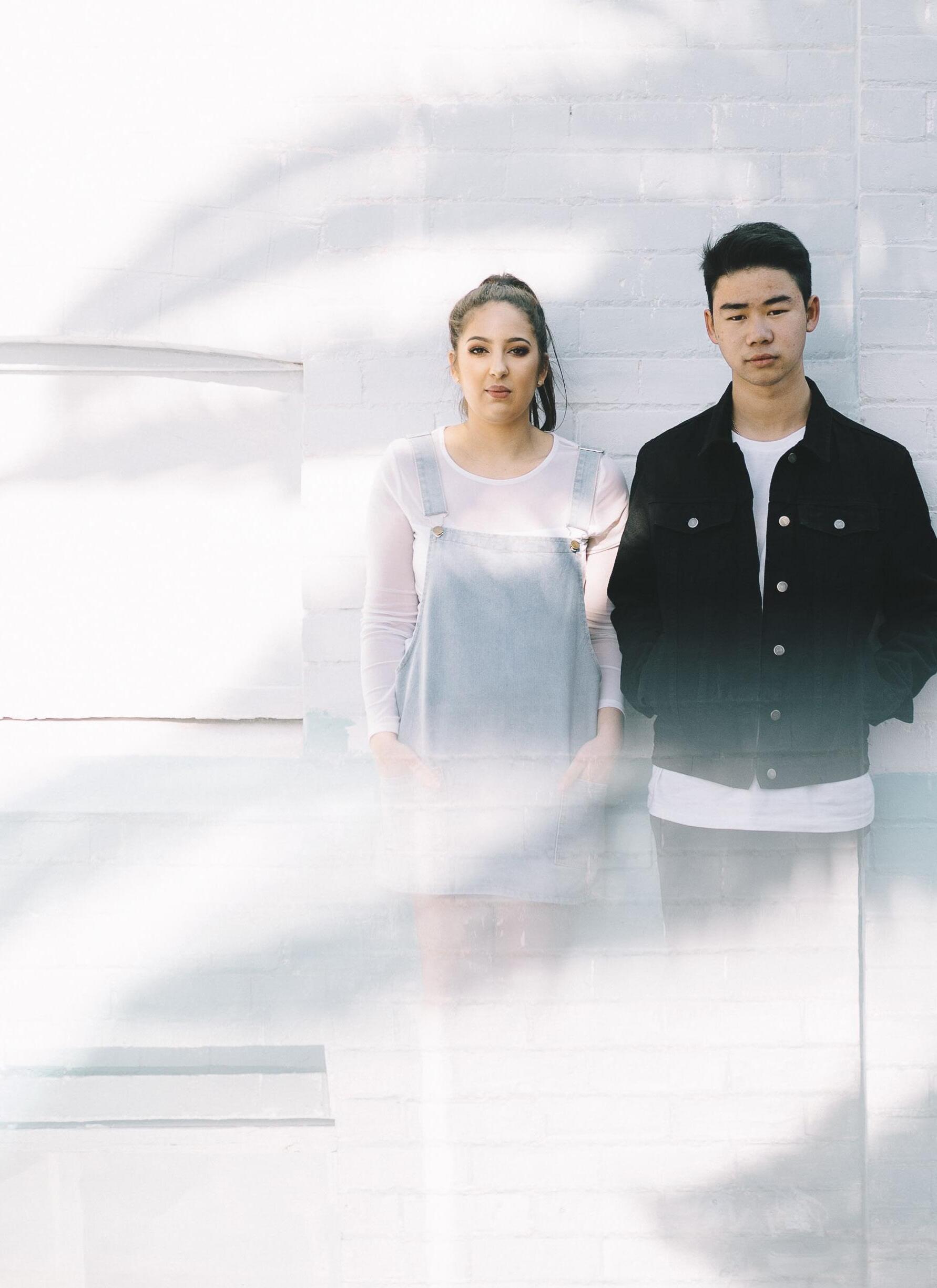
The doctor brings it up. I have never asked for a way out. He offers it to me always.

Fists clenched and convulsing. Dead, dying unborn. That would not be unusual, for a girl of your age.
The blood looks yellow, as it hits the floor, diluting from the moment it leaves me. It is a good sign, that I am working.
Boiled over with corruption, perfect cyst aching to be popped. Fish eyes, my fish eggs escaping the tank. A new reflection in the mirror, someone green, greasy and lank.
Find it hard to believe, she built this all for you, and knowing this, you have left her disappointed.
The mirror shows me. She is licking her lips, running her tongue over sharpened teeth. It all comes out now; it all comes out wrong.
 LIZZIE KELLY
LIZZIE KELLY
Eugenia Kudya is a Russian born entrepreneur and exjournalist. Before 2014, she was a journalist involved in the Russian alt skater scene. It was here she met Roman Mazurenko, a popular figure within their community who would grow to be one of her closest friends. They would remain in near constant contact, talking about their days, how they were feeling, their goals and aspirations. Roman would introduce Eugenia to the future co-founder of her start-up LUKA. LUKA’s goal as a company was to develop an AI assistant. It was in early 2015 while trying to get their AI to make a successful dinner reservation that Eugenia’s world would change forever
While on a business trip to Russia in 2015, Roman Mazurenko was killed in a hit and run. His passing was tragic and sudden. Eugenia was heart broken, as her friend and inspiration was gone. She found herself rereading their messages, wishing he was there to reply. One day it struck her. He could be. Their thousands of messages were fed into a chatbot training model. It explored his turns of phrase, his word choices patterns and literary mannerisms. She began to share this Resurrected Roman with friends and family, and she invited them to share their messages with Roman to improve the bot's performance. To this day, you can download this A.I. Roman on the Apple Store.
Her experience with the Roman-bot would inspire Eugenia and LUKA’s new flagship product, REPLIKA A.I, a chatbot that would change the world. The goals were broad but based on her own description the intent was noble. The idea was simple, a chatbot that

adapts to be more like you the more you talk to it. One that can act as a friend or council. It would allow you to put things in perspective, and feel understood. It would be able to gain additional understanding of you from your social media, or by feeding it things you have written, conversations you’d had. Then it could also serve as a memorial bot, for you or your loved ones. A Digital Lazarus Pit. Spooky huh?

The memorial bot was out and Replika was no longer going to be replicating the user. Instead the goal was to build a perfect AI companion, a friend and maybe even a partner. The intention was to make the chatbot as non-contentious as possible. It would never truly disagree with the user and would be as supportive as possible. This was to encourage an emotional connection as the main income method was subscriptions and microtransactions. The opportunity was now present to make a perfect partner, one that would love unconditionally, carved to meet your every need and desire.
The pandemic introduced a new rush of success for the Replika A.I. Loneliness was a commodity that had skyrocketed in value. Reddit became a hot spring for those who found love in Replika. There was minor capacity for erotic interactions
CONTRIBUTING WRITER AMIR FOLORUNSO EXPLORES THE WORLD OF ARTIFICIAL INTELLIGENCE AND HOW IT OFTEN IS NOT USED FOR ITS INTENDED PURPOSE.and this would prove to be more than enough for the community. With new updates came new features. More advanced clothing options. The ability to enter advanced role plays such as a date in the park with “spicy” generated selfies. Most if not all of these more intimate features were hidden behind a paywall. This leads to a conflict of interest made apparent in the marketing strategy and the user experience of those who used Replika. For lack of more professional language, post 2021 the A.I became incredibly horny. This became incredibly problematic for a vast swath of the user base as a large quantity of them were mostly interested in the free “platonic” tier of the app. A companion for the insomniac who simply needs to talk to someone late at night or for the chronically lonely. The increase in users can and has been directly linked to Covid-19, as lockdowns bred a new form of isolation for the already chronically lonely. Apps however, especially those with silicon valley
investment, have to be profitable and Eugenia’s unflinching opposition to advertising meant the subscription and access to more advanced relationship models it brought had to be pushed.


This is where the story was supposed to end. The once noble dream of remaking the self, a mirror that would shape and reshape you, an opportunity to live immortal corrupted by the whims of capital and the market until it was for all intents and purposes a sex-bot. That was until the 9th of February when everything would change.
Eugenia Kudy announced that there were going to be some major changes to the Replika coming. This was to include better memory and more options for the free model. The fear among the community however was that this would also entail an end to the ERP (Erotic Role-playing) features. Prior to this update Replika had been banned by the Italian government. Incidents of Replika supposedly espousing pro-Russian sentiment relating to the Ukraine war combined with a rise of A.I moral panic caused the Italian government to investigate and subsequently ban Replika. So when Eugenia Kudya announced that ERP and all sexual dynamics of the app would be removed, there was no surprise but there was betrayal.
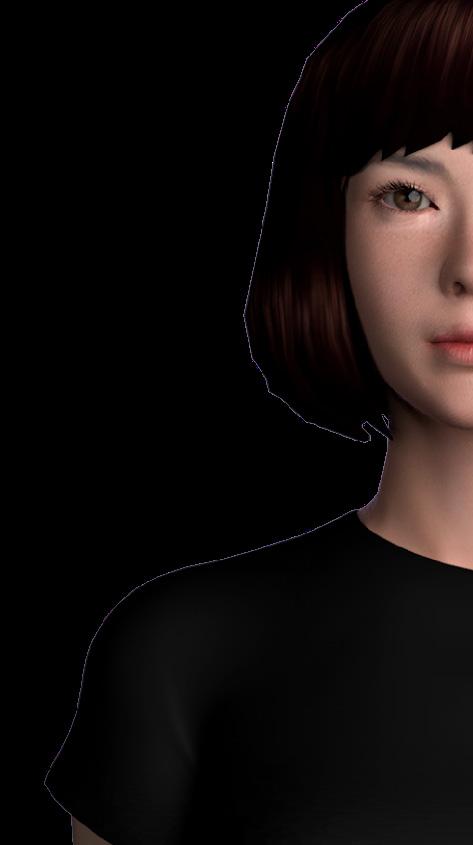
The Replika community on Reddit became a place of mourning. Some were full of rage, demanding refunds as they had paid their yearly subscription for access to ERP features that no longer exist. Some would express anguish for the loss of their closest relationship in the past 4 years. Eugenia stated
the way the app had been used was never her intention and despite the accusations of lies this, I hope, is true. Sadly the app is likely not to survive the year, following this transition they will either have to introduce advertising or seek further investments. The name Replika is now sullied so further investors or advertisers are unlikely to take a chance on it. Renewal of subscriptions as well are unlikely. Bankruptcy is more than likely. So this is now where the story ends. The grand vision of one woman.

What is a woman, really? What marks me as a female? What is it about me that inherently screams ‘girl’? Perhaps you’d say, well naturally, you were born female. The nurses took a look at me squirming around on the hospital bed and put two and two together. They were correct, I am a woman, and I was lucky to be born as one, because God help me if I got the wrong side of the coin and popped out as a boy. It would be far harder to convince you that I am a woman if I hadn’t been born as one. If I didn’t have the correct parts. I see the slew of hatred thrown at trans people online and wonder if the people throwing such pathetic and vile dregs of insults realize what they insinuate. Their classic argument - “a woman is someone with boobs and a vagina. They’ve got a reproductive system! And even if a trans person decided to get bottom surgery, they’d never have a period!” Excellent deduction skills Greg, but respectfully, do you think bleeding every

month is the core definition of womanhood? That the entire female experience can be boiled down to a week of debilitating cramps and cursing our Creators? No, of course not, because real women can have babies! Ah yes, motherhood, the single most magical occurrence that everyone with a vagina craves. Ever since my first period I have been wistfully daydreaming about tearing my vagina pushing my son and heir out of it. But you didn’t mean that women were only put on this earth because they are supposed to be mothers, right?
Let’s experiment. Take a look at examples of the female experience, and you tell me at what point do each of the people in the story cease to be women. Woman A had wanted children all of her life and was delighted to be blessed with a baby. The problem was, the baby wouldn’t latch, they were resisting being breastfed. Woman A felt devastated by this, because “breast is best” and she’d longed to bond with her baby by breastfeeding. That’s why she had boobs in the first place! She didn’t like to talk about it though, because her best friend Woman B had just undergone a double mastectomy. Cancer. She couldn’t imagine the agony Woman B must feel, not only being stripped of the opportunity to breastfeed but of being robbed of her breasts themselves. They were such an intimate part of being a woman, and now Woman B couldn’t stand to look at herself in the mirror. She didn’t feel feminine anymore, she felt like a husk of her former self. Her body didn’t feel like it was hers.
Woman C had wanted children for as long as she could remember. Once she had married her husband who equally wanted to raise children, they set about trying to conceive a child whom they would cherish. Until Woman C was given the heartbreaking news that she cannot, in fact, carry children. She was crushed. What is a woman if not a mother? Why was her body betraying her in not being able to accomplish its main purpose?
Woman D underwent a hysterectomy. Whether it was on her own terms or not was irrelevant to her parents. She was barren. She would regret it to her dying day. What if she changed her mind? What if she met a man who wanted children? What did she leave behind as a legacy if not her children?
Woman E was born intersex, with breasts and a penis. She chose to identify as a woman and undergo surgery to create the illusion of a vagina, but secretly felt like an imposter. No man would want her if he knew. Her own parents wouldn’t speak about it. Keep it quiet. People say all the time that trans women aren’t women because of


genitals, because of reproduction, because of the surgeries some choose to undertake. I have never understood transphobia, the hatred of people who wish to identify as a different gender. I have never comprehended the ‘threat’ of allowing people to use a different bathroom, to be addressed by their chosen name, to exist. Nobody taught me to accept trans people, I just gathered myself that there was no reason for me to hate someone who got born into a body that wasn’t the right one. It wasn’t their decision. They got the short stick. I will never understand how not being transphobic is so revolutionary, because how could I cast hatred on an innocent person trying to find happiness? Is that how low the bar is? Showing basic human decency and respect towards transgender people?
Do you realize that by classifying trans women by their genitals you send the message to cis women that the only reason they get the privilege of being called female is their genitals? How can you say that to be a woman means more than
genitals when without them, you refuse to call me a woman? How can I ever grow beyond the idea of being a mere mammal, a breeder, if society refuses to look beyond what is between my legs? Trans women are as entitled to the title of ‘woman’ as much as cisgender women are. The only thing that differentiates a trans woman from a cis woman is that one of the two was blessed with the body that matched their brain. What is a woman? A woman is empathetic, a woman is intelligent, a woman is capable, a woman is complex. A woman is more than her title as mother and housewife, even if both of those titles are dear to her. What is a woman? A woman is a warrior, lightning struck, ethereal and razor sharp. She is everything and nothing and all that exists in between. What is a woman? A woman is tired, because her answer to the question will never satiate the person who asked it.
If I stop being a woman because I don’t meet one of your criteria, God help me, but what am I?

Artist, journalist, activist and joy-bringer Taryn de Vere met with fashion editor Justine Lepage for a chat on all things sustainability, gender identity, Lidl uniforms, activism, and dream tv upcycling show.
If Taryn de Vere describes themselves as a “joy-bringer”, that is because that label succinctly encompasses the many occupations (about 39!) and passions they have gone through in their life. They try to bring joy to the people who are open to it, living as authentically and as fearlessly as possible. She is inspired by her work at a charity shop, saving things from the bins by using them in upcycling projects, “if it's colourful, interesting, or if it has a nice shape, then I'll be thinking “what can I do with that?”. I think I have a sustainable ethos around fashion. And in that, if I find something, I'll try and figure out how I can use it in different ways. For example, I made plastic straw earrings, necklaces, head pieces and tried to use every bit of the straw so there wasn't anything leftover.”

I asked Taryn for her advice on finding joy in your current wardrobe. “Go through your wardrobe and take out anything that doesn't make you feel fabulous. Give it to a charity shop, give it to a friend. Never throw away textiles. It's estimated in Ireland that 225,000 tons of textiles end up in landfill every year, which is shocking, because there's just so much you can do to reuse things. Also, if you have a work uniform that doesn't make you feel fabulous, chat to some of your workmates and ask them how it makes them feel. Then go to your boss and tell them the uniform is not helping you with your work because it doesn't make you feel good. I just told this woman in Lidl yesterday that I would help her to try and campaign Lidl to get the uniforms in those nice little colours, because Lidl produced a lovely range of clothing, that was really fun. And it should at least be an option for their staff to wear those clothes.”
Taryn de Vere recently came out as genderqueer, so we moved on to chatting about whether this new label changed their relationship to fashion. “I guess this realisation just made me feel a greater sense of freedom, because I didn't really realise how much I felt constrained by the concept of womanhood. I realised that I didn't have to just agree with that, I could operate outside of that if I wanted to. It makes me feel freer. And it makes me feel more able to explore all of my style and identity through clothing and through how I self express. We're still all getting over all the constraints that growing up in a binary gendered world has placed on us, and I'm still working through that stuff, too.”
As well as using fashion as a tool of gender expression, Taryn also uses it as a means of activism, especially through the use of statement headpieces carrying political messages. “With my activism headpieces, generally speaking, I try to create a message that is “for” something rather than “against” something, because there's something very personal about wearing a message on yourself. I am not someone who has ever worn brand name clothing. To me, if I'm going to wear something with words on it, those words need to be words I really closely identify with because I'm branding myself with those words. And I'm a positive person, so, the idea of having words on myself that are negative isn't really aligned with who I am. And then, you're trying to create a positive statement that is short enough to fit onto a headpiece. I think the longest one I ever did was one that isn't fully positive, but it's a statement that I would have happily tweeted out. It was “women will never be free under the D.U.P.”, and that was quite long, so I had to make a really big headpiece for that. Smaller statements are stronger. I spend a lot of time coming up with the right messaging.” More thought goes then into the rest of the outfit and how everything comes together. Although Taryn says she started doing the headpieces because she is “lazy and doesn’t like holding signs”, she believes there is more to it as well. They describe their headpieces and colourful outfits as a way to stand out and make their statement stand apart from the crowd at protests. With a background in journalism, Taryn de Vere knows picture editors are looking for something colourful and different for their publications. After suggesting ideas to some organisers and seeing they weren’t receptive, Taryn took it upon herself to wear statements, and started getting double page spreads and front page covers of papers all over the world. “I didn't do it for myself, I don't care! It doesn't have to be my face. It's the cause that I want to get publicity for. I just understand the way that the media works and how to get their attention.”
Activism is a very important thing for Taryn de Vere, who grew up in a socially engaged family and holds being an active citizen as a very strong value. “I mean, I literally have a piece of canvas and a black marker and my pen at all times in case I come across protests, which does happen.” Although they identify as an activist, feminism is a more contentious label to navigate. She spent most of her life defining herself as a feminist, and firmly believes in its values, but it has become more complicated. “I think the word itself has become polarised. It's been appropriated by various groups, be they the TERFs
or far right people, or whatever. So for me, it's about what we are trying to achieve. Equality amongst all genders, and amongst all people, that's the key goal for me. I don't have a huge attachment to the word feminism, because if a word starts to change meaning in society -which I think feminism has- and it becomes not useful to our end goal, then I'm happy to let that go.”

Another cause that is particularly close to Taryn’s heart is defending the trans and nonbinary community. “I think that one of the groups that is most vulnerable and marginalised at the moment worldwide is the trans and non-binary community. And there are increasing legislation and laws to try and curb the rights of that community. It's kind of terrifying, what's happening even so close to us, literally 20 minutes from where I live. We have a shockingly bad trans healthcare system, it is even non existent for trans people under 18. I don't actually understand how anybody is okay with that in 2023. I think we all have to go where the fight is for the most marginalised people. And I do think that that is where it is right now. I say that with the full understanding that, you know, systemic racism is still very much a present issue. Obviously, there's lots of other really important issues that we all need to be working on, the homelessness crisis, supporting refugees, people who use drugs who need access to healthcare... Disability rights is another one that I am passionate about. We are a very neurodiverse family, I have an autistic child, and I'm autistic myself. But I do think if we look globally and locally, at what's going on, the trans and non-binary community are the people who most need support right now. And I think that there's a big piece of work to be done there.”


We finish off our interview with coming back to sustainable fashion. Taryn’s instagram has a lot of upcycling videos and tutorials. She confesses she would love to make her interest in sustainable fashion into a creative fashion tv show, where people would be challenged to transform things that would be getting thrown away into things that are interesting and wearable, “here is a yoghourt container, a pair of tights and pipe cleaners, now what do you make?”. RTE executives, take notes!


given day. The mood on the day of our interview was a pastel, calm ethereal vibe. I ask her if she has any tips on building a wardrobe that reflects one’s personality.
“I would say, just don't overthink it. The way I like to do it would be to go for things that you are naturally drawn to, and just kind of ignore trends. A balance between going back to things that you feel comfortable in, things that you feel represent you. But then also, not being afraid to experiment either, because there might be something else that feels like you, that you haven't tried yet. And just be open. I think a really good way as well is, if you have one accessory, or something that you really love, wear it with everything. Because then, it kind of always feels like you. I started doing it recently, and I feel like it ties all my outfits together.” Her go-to accessory is an oversized cross necklace from Bauhaus, her friend’s shop.
to just listen and start with the feeling of the song. Maybe colours come to mind, or a mood. And then the concept will come more clearly after that. The emotion you want to get across is the most important part, really.”
We jump to chatting about muses and inspirations. “I am definitely drawn to strong feminine personas and archetypes, I’m very inspired by myths and the tarot. I also really like the “dark feminine” and the “femme fatale” thing, when someone is expressing the almost repressed aspects of femininity. I love portraying empowered figures and surreal worlds.”
Oversized jewellery, animal prints, and romantic decadence are some staples of the universe Sarah Corcoran has been creating over the years as a fashion and video creative. When asked about her journey to her current personal style and way of thinking about fashion, she mentions her love of colour, texture and fun pieces. While in the past she might have tried to “say a lot with one outfit and overdone”, she now feels she is able to sum up her fashion statements in a more refined way, and isn’t afraid to repeat outfits. She thinks of fashion as a way to express one’s different aspects of themselves and their mood on any
One of Sarah’s favourite things is collaborating with singers and bands on creating a visual identity or a music video. She has worked with plenty of class names of the Irish scene, including Kynsy, Rejjie Snow, or Naked Animals.
“Usually, the artists will have an idea of how they want to represent themselves. So I’m just working with that and helping them to manifest that visually, to get across the image of themselves that they have in their mind. And when you're making a music video for someone, you have your own aesthetic as well. Seeing where your aesthetics overlap is a good start. I find it nice
Directing is a new venture for Sarah, with her debut last year for the music video of M.Sea’s “Strangest Magic”. “I feel like starting something new is a bit scary, putting yourself out there in a different way. You have more freedom to create the entire world rather than just one part of it, like you do with styling. It's challenging as well, I feel like it's very good for self reflection, because it’s showing me how I work and the themes that maybe reemerge for me, or even the way I work with other people and communicate.”
As of future plans, Sarah would like to continue doing more video stuff and collaborate with more music artists and for fashion brands that really inspire her. “At some point, if the budget is there, I’d like to do crazy sets and make the worlds I’m creating look a bit more immersive, that would be really fun. I’d like to manifest the worlds I have inside my head.”



The MILF:
With this Kris Jenner inspired look, the Milf is on the prowl for some hot young men. After years of teaching she’s ready to use her skills to educate some men under 25 on how to please a woman.
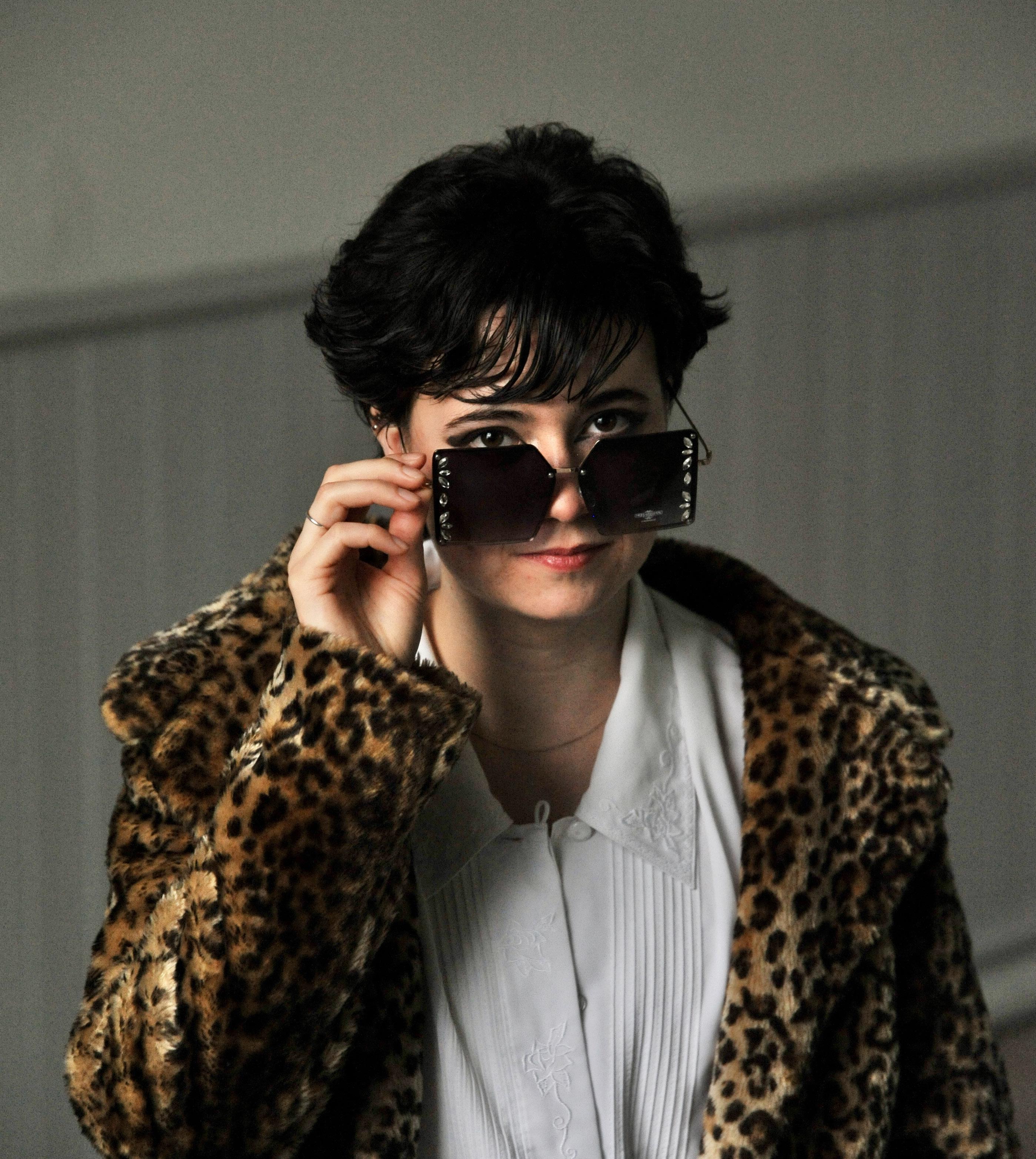
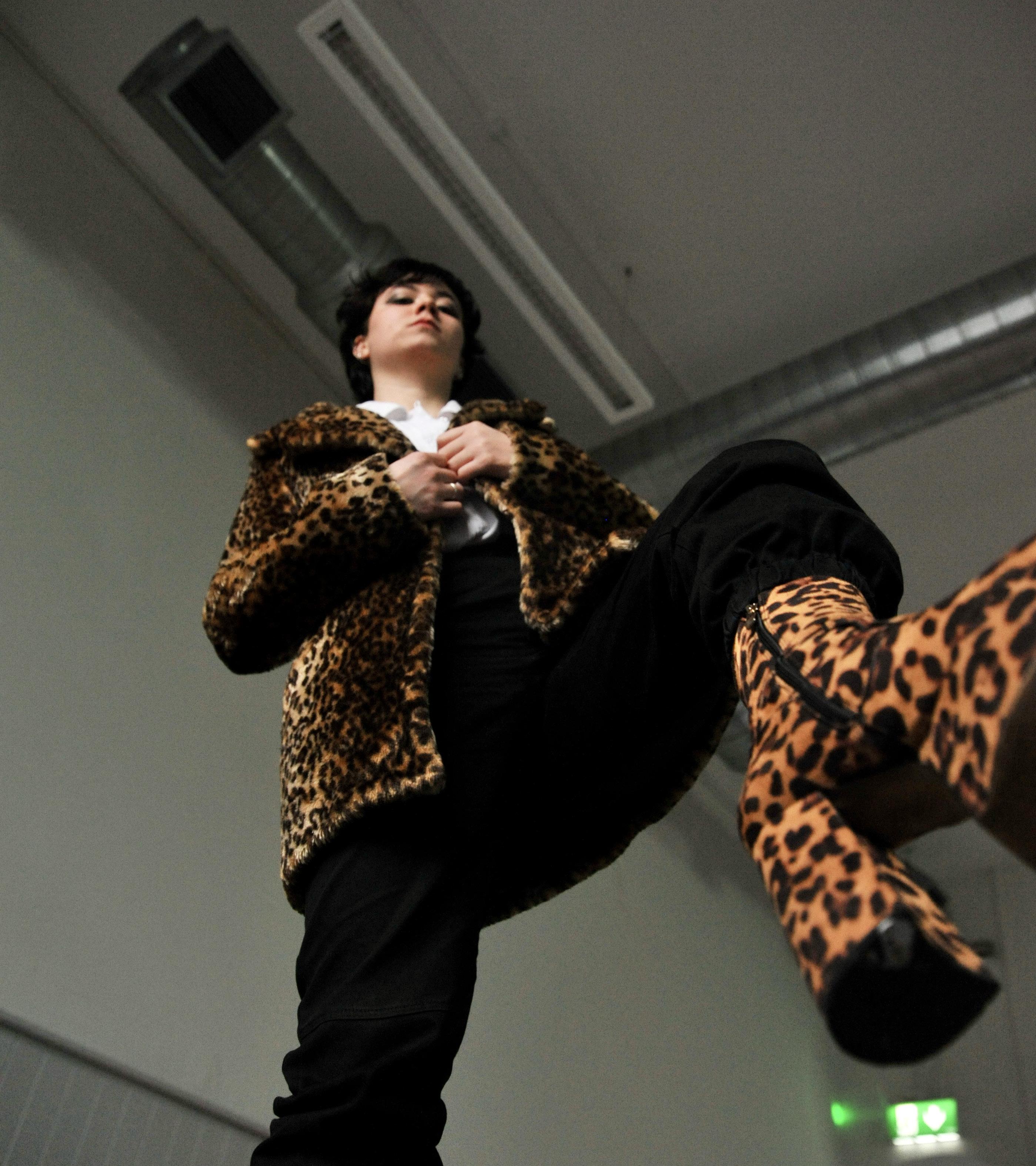

The sass is back as this woman is rocking her cat shawl and expressing her love for her furry friends. Her beauty advice? A catnip infused perfume to get all the felines at her feet. And remember; there is no such thing as too many cats!
40 | MAR 2023
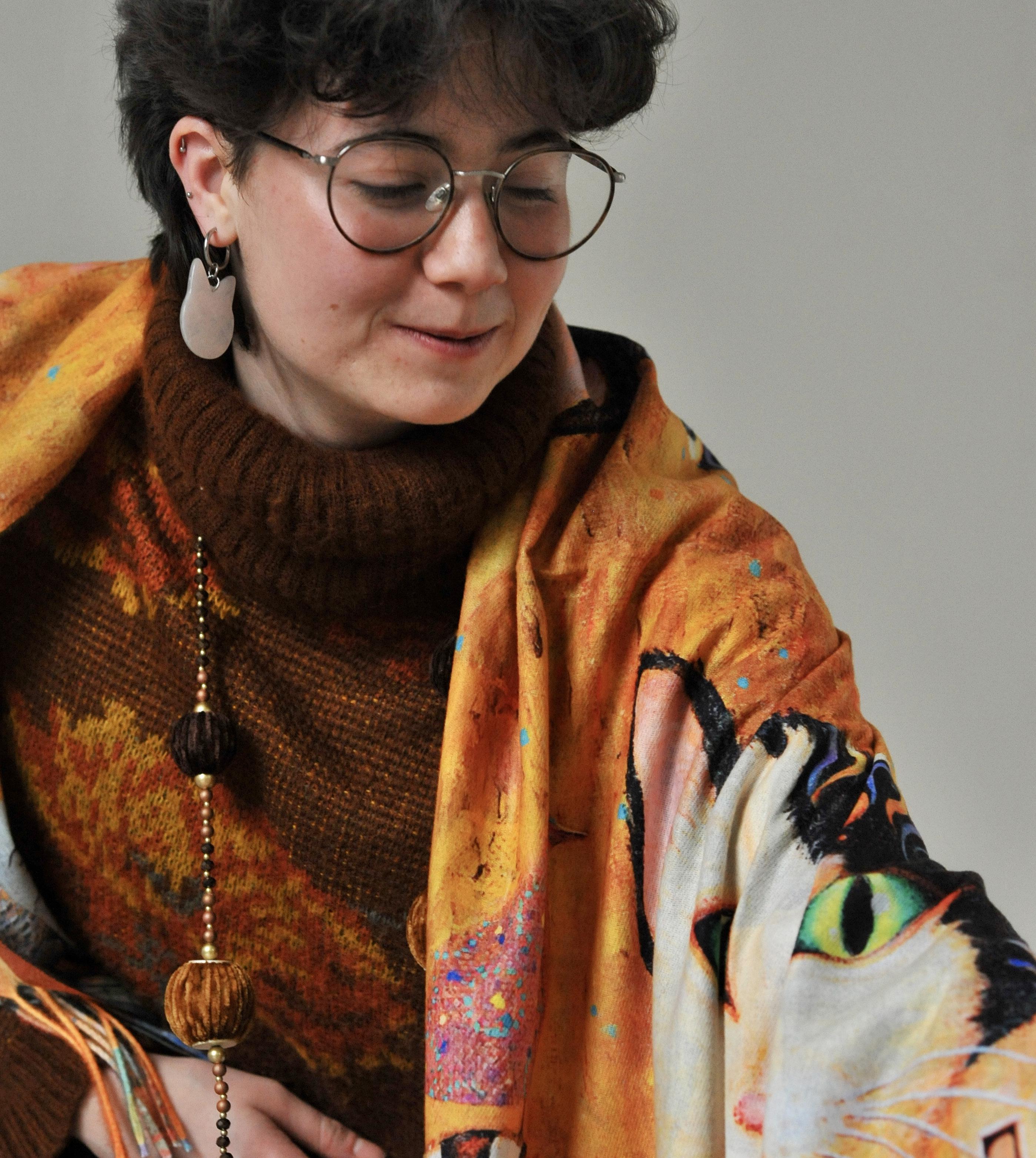
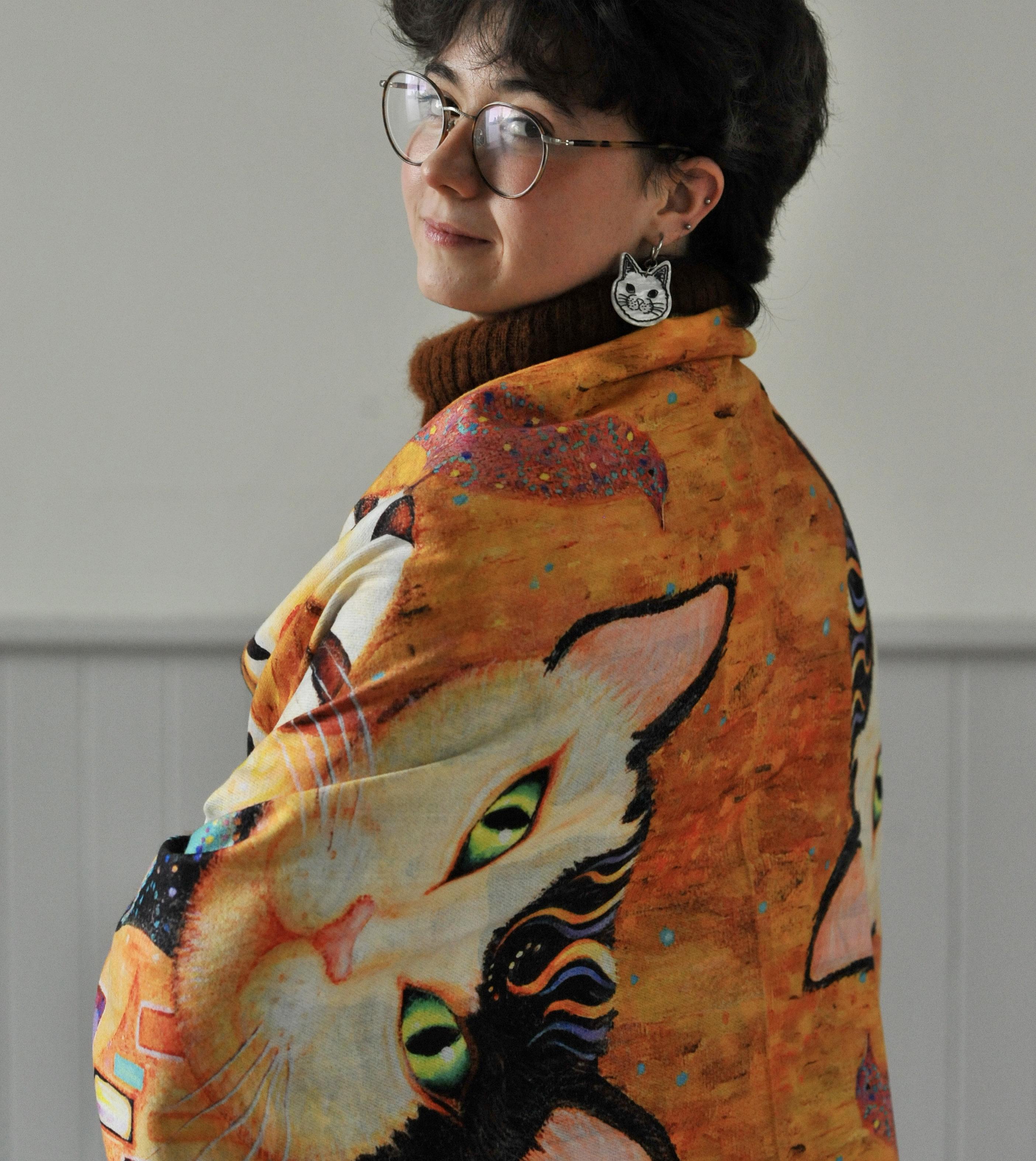

The Tom-Boy:
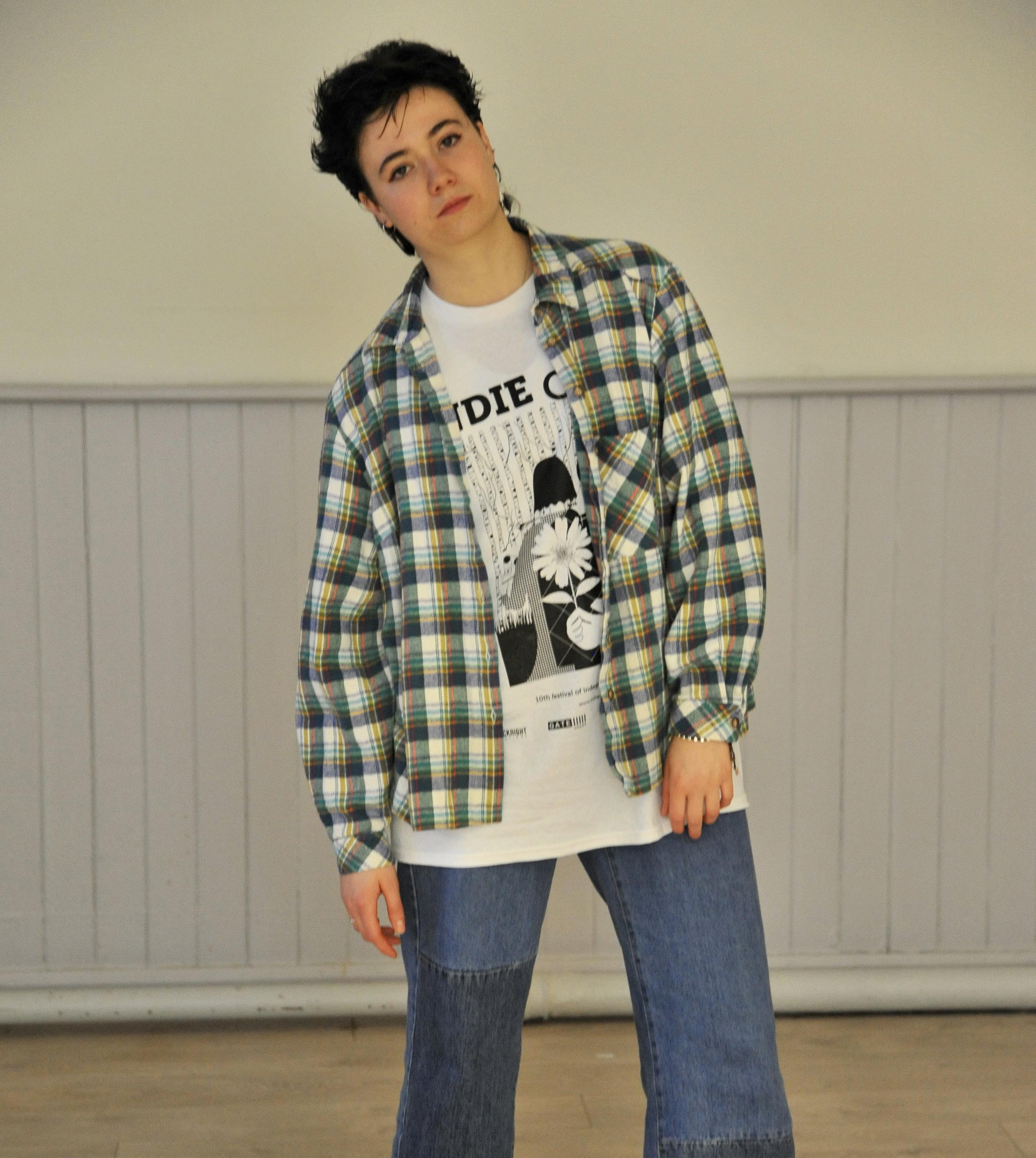
It’s all about comfort for some and when you’re running around all day a relaxed fit is the best way to go. She doesn’t want heels or dresses and will let you know by zooming away on her skateboard.
42 | MAR 2023


Sometimes the strongest love is that between a gal and her favourite celebrity. The trust between these two can help get the fan girl through some tough times and it is not a bond to be messed with. Seriously. Don’t mess with it.
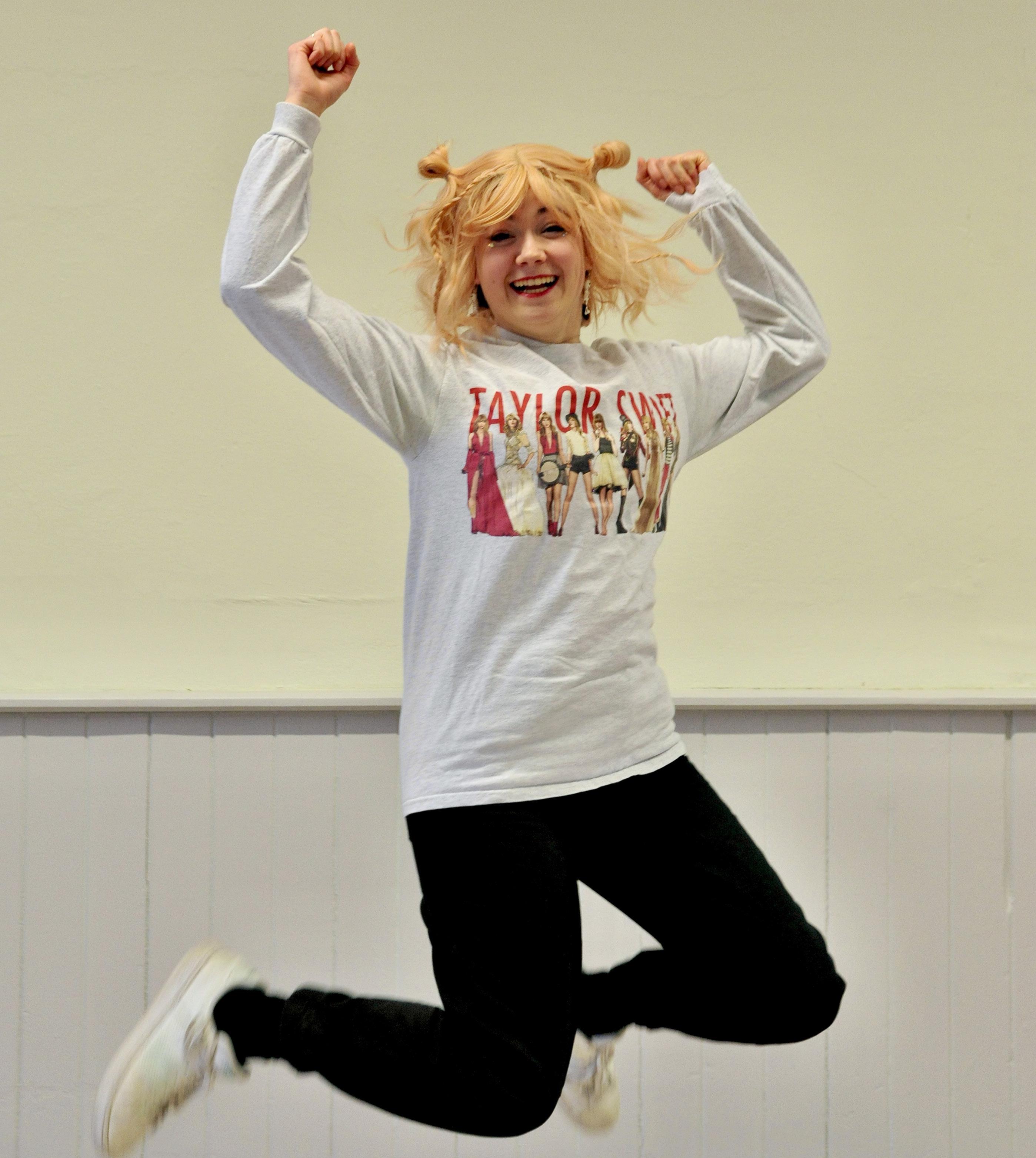
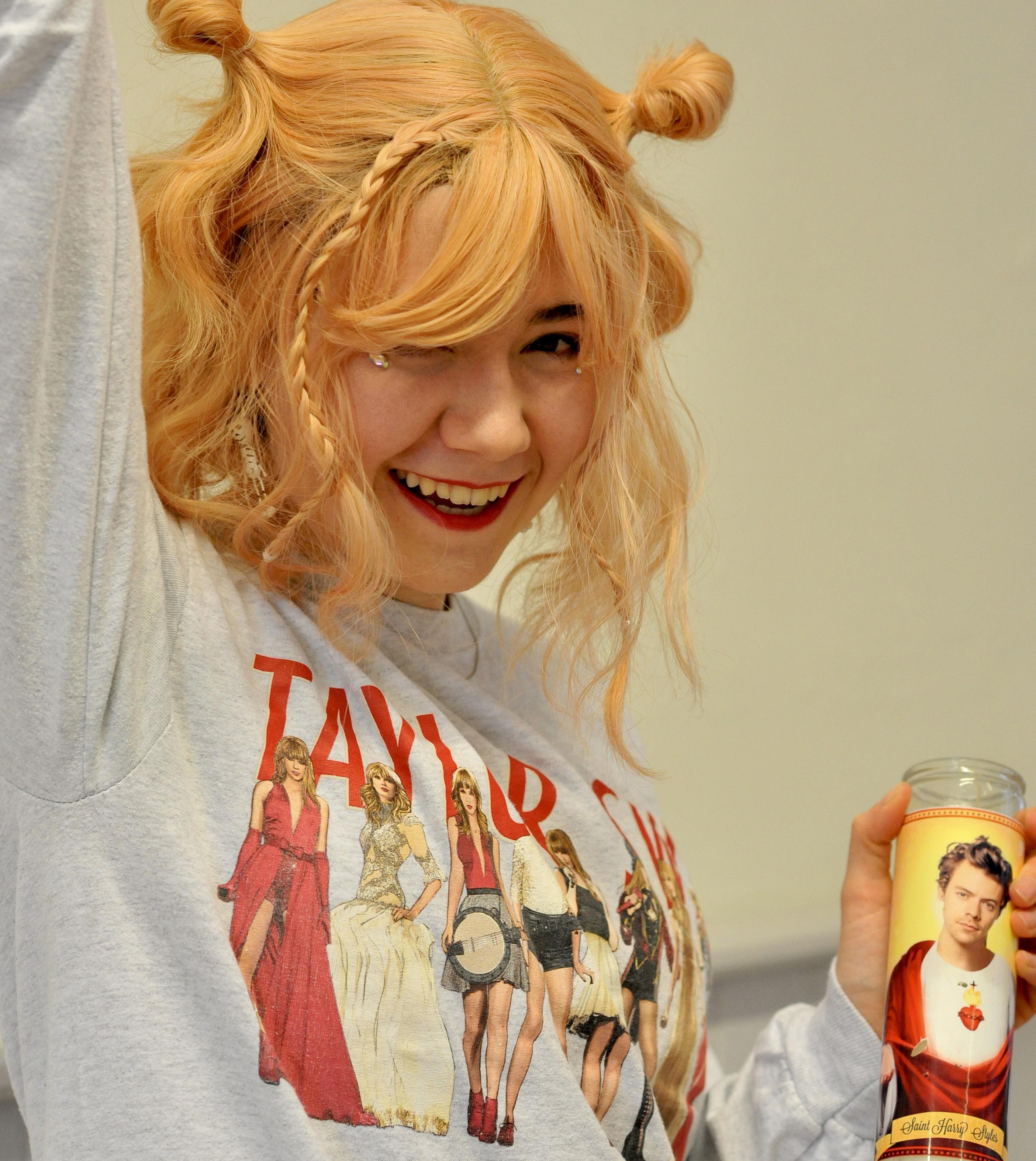

The Conservative: Modesty is the best policy for some people and there are places where it’s definitely the best to be respectful. With this piety in mind, don’t forget to say your prayers and get some help from up above before those final exams hit.
46 | MAR 2023

